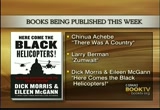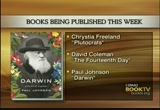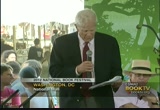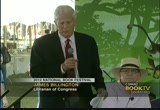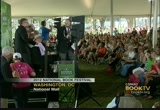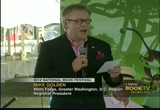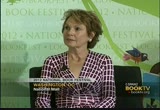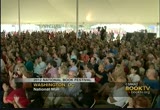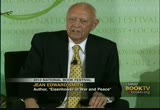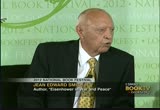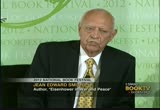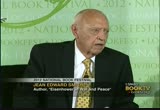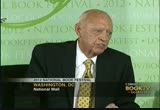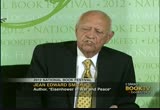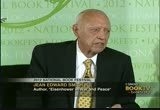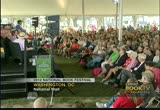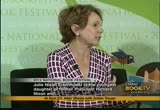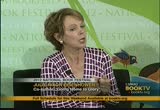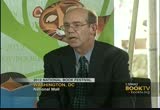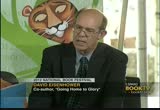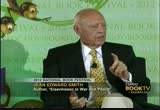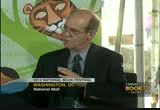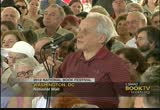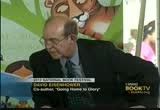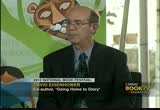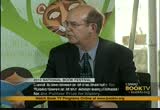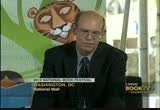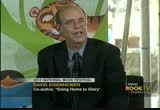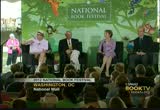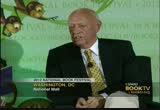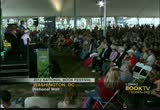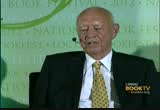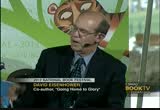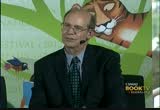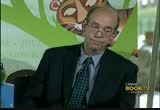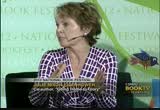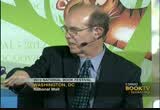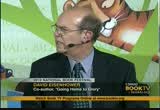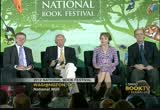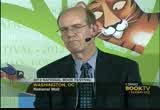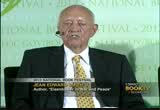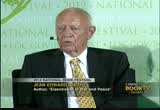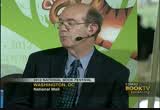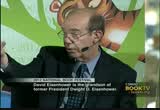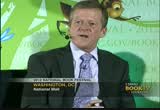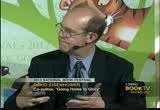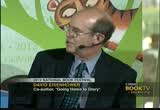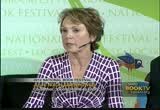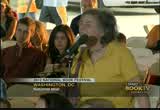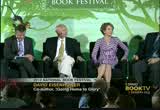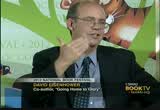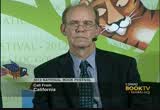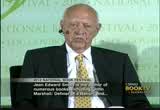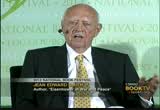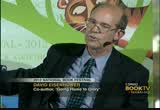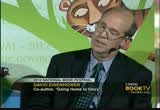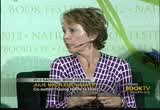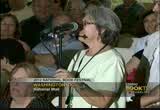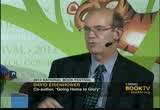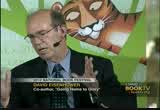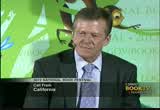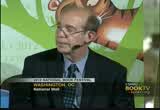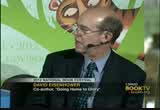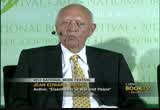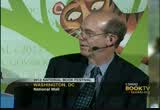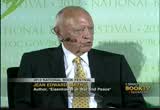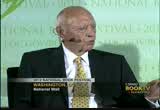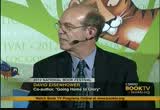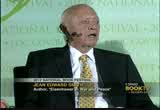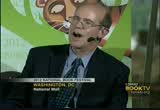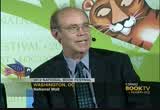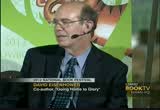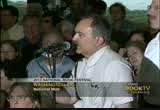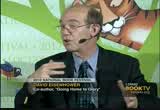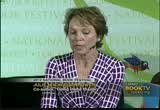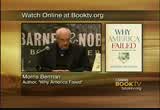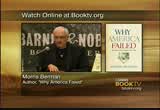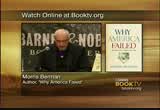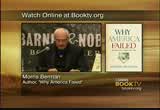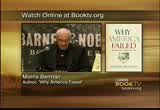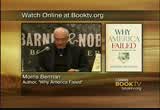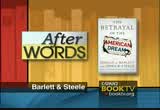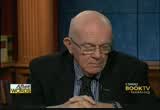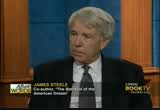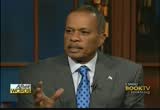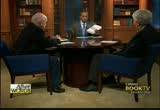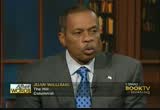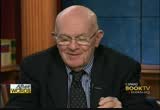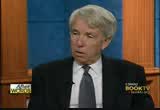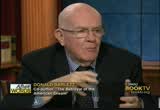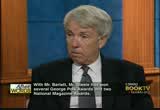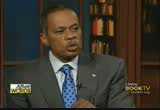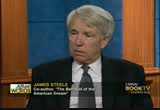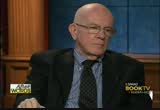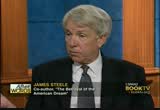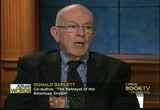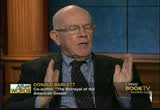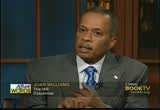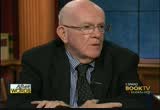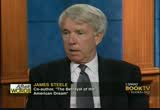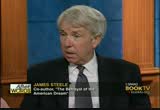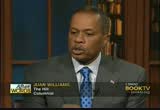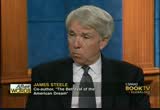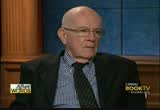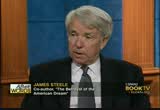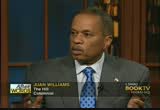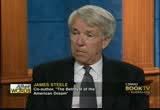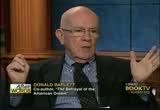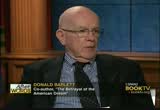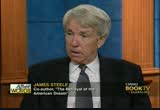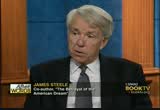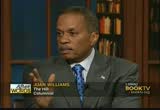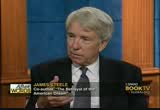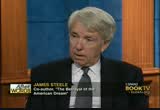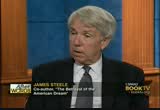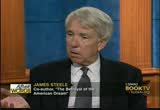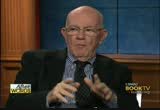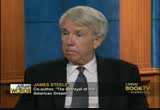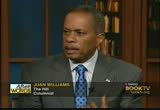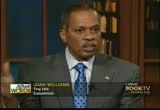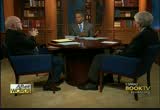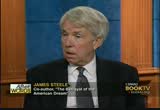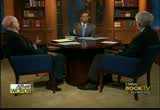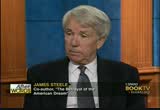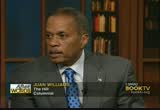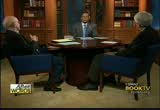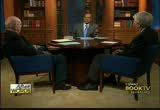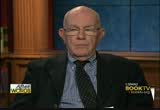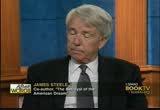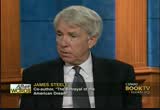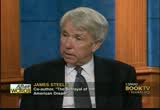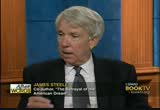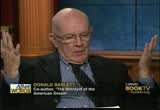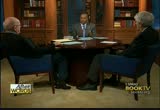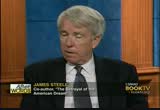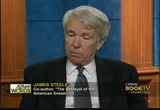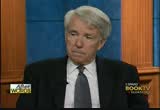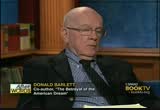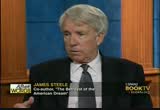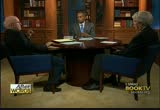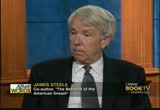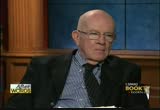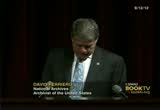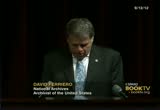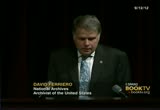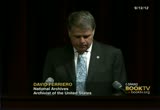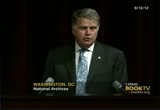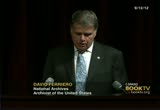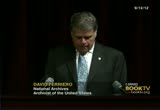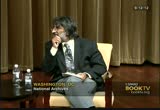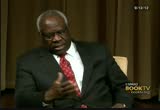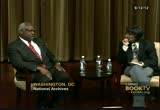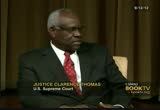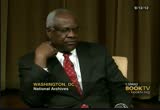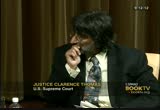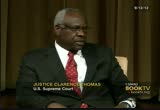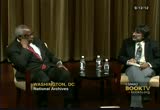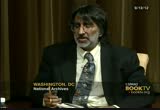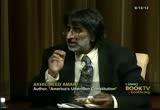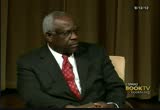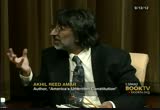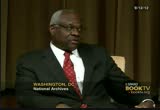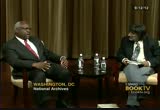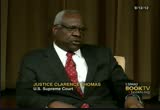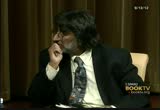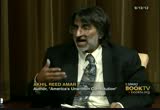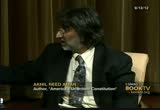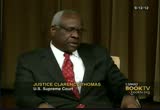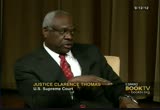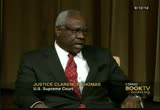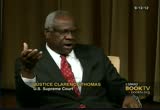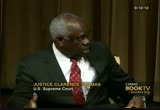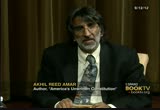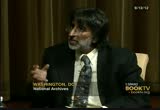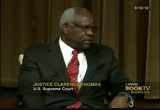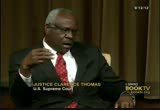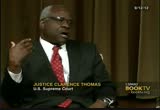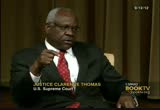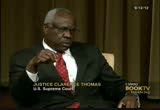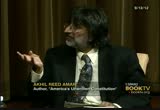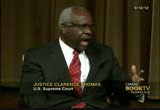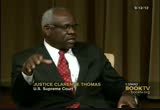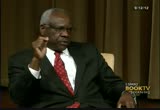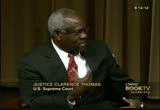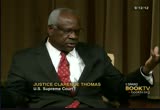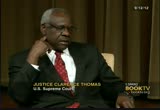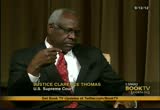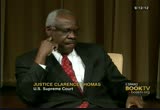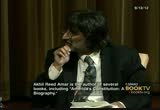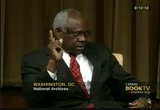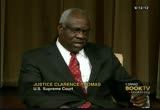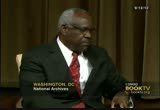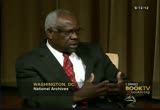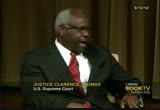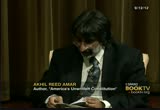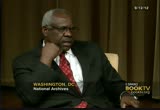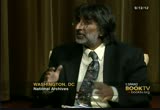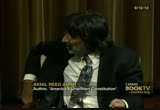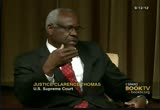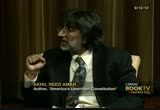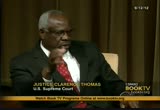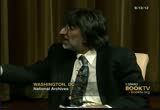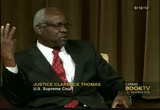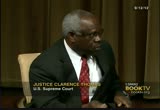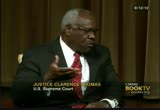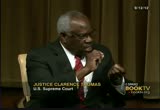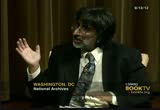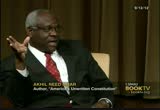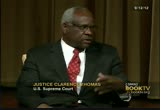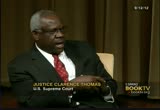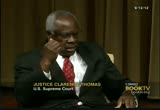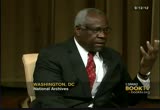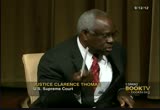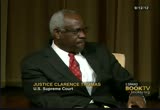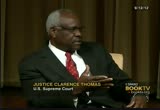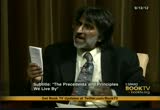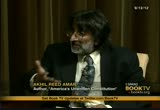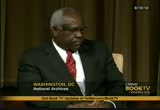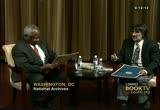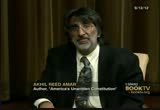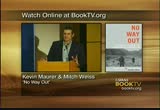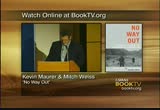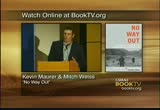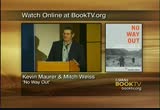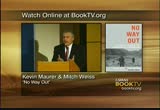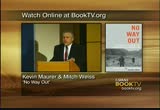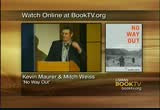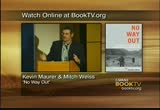tv Today in Washington CSPAN October 9, 2012 2:00am-5:59am EDT
2:01 am
2:02 am
thankful. your responses make the free public event possible, and one of them is the wells fargo, which has been the sponsor of this particular pavilion, history and biography. in a moment, i introduce to you michael l. golden, wells fargo's regional president for greater washington, d.c., who will introduce our closing authors today. we're privileged to have with him, of course, not only an extraordinary biographer but also the two inheritors of the legacy of the man who is not only led what is often called the greatest generation to victory in the world war ii, but also led the country to eight years of peace and prosperity, which are now becoming recognized in good part thanks to these authors we have with us
2:03 am
today, to close things out. being recognized by historians for the contribution he has made to our national life. so, ladies and gentlemen, i'm happy to hand over for the last act in your main tent, wells fargo sponsored for us, mr. golden, who will introduce everybody and it's a tremendous closing act, if you like, to a wonderful day, blessed with sunshine, with all your presence, and i think we've got an extraordinary cast for this which he will be pleased ands to introduce, and i'm sure we're all going to profit from this wonderful last act to a memorable day. thank you, and all the best to the people in the discussion. mr. golden. [applause]
2:04 am
mr. golden. [applause] >> thank you, dr. billingsley. wells fargo is delighted be one of the desponsors of the book festival and the history pavilion. next we have a very special program devoted the life and legacy of dwight david eisenhower. i'm especially pleased to introduce this segment because i was born at the end of the eisenhower presidency. some of my grandfather's favorite memories -- my favorite memories were spent with my grandfather who was a huge president eisenhower fan. such a fan that when he visited my mother and i in the hospital for the first time, he told my mother, his daughter, i have the perfect name. let's name him dwight david gelden. my mother preferred michael, obviously, but throughout my childhood, my grandfather reminded me many times, you were really supposed to be named
2:05 am
dwight david golden. how delighted would my grandfather be if he knew who i was about to introduce today. we're fortunate to have david eisenhower and julie nixon eisenhower joining us, david is an author, public policy fellow and grandson of dwight david eisenhower, a scholar at the an anyoneburg school of communication in pennsylvania. in 1987 he was a finalist for a pulitzer prize for his book, eisenhower at war, 1942 to 1945. david's new book, co-authored with his wife julie eisenhower, is going home to glory iry, a memoir of the life of dwight d. eisenhower, 1961 to 1969. like her husband, julie eisenhower is also an author. she is in addition the daughter of the 37th president, richmond m. m. knickson from 1,973rd to 1975 she was assist stand managing editor for
2:06 am
the saturday evening post, and weles welcome jean edward smith, white house book is, eisenhower in war and peace. he has written much praised biographies for franklin del know roosevelt roosevelt and ulysses s. grant. mr. smith is a senior scholar at --s' spent time at the at toro. and our moderate you're will be jonathan yardley. he has been a feeman fellow at washington university. his most recent book, a compilation of the most memorable reviews of noted and neglected book from the past. please join me in welcoming david and julie eisenhower, jean edward smith, and jonathan yardley. [applause]
2:07 am
... we don't have much time so i'm going to ask our panelists to get right to it first mr. smith and then eisenhower to tell you about the books they are here to talk about. >> thank you very much. eisenhower in war and peace first as a general and then as h president we are dealing reallya with one ofl the most underratd of figures in american historyhd both as a general and as president.you one of the reasons bumper stickers in the election of
2:08 am
1956. ben hogan for president. if we are going to have a golfer, let's have a good one. [laughter] eisenhower was franklin roosevelt's first choice to command the d-day invasion. eisenhower had three amphibious landings under his belt at that time. he got along well with the british and was churchill. that was very important and professor roosevelt there was no question he was going to pick eisenhower although he gave general marshal the opportunity to accept -- text to command the invasion if he wanted and eisenhower was characteristic, self disciplined, refused to express an opinion and president roosevelt selected ike. no one else could develop the western armies together as he could and his decision to land on d-day in spite of the weather caught the germans totally by surprise. they had no idea that innovation
2:09 am
was coming. can you imagine 5000 ships in the english channel and the germans not knowing it because of the weather? that happened. the decision to want to take pairs with ike's decision, to take paris was his decision as well. they were to bypass pairs and continue to the german army. he said he would not destroy it if the allies could get their and they really only had two days to do that. otherwise he would relieve them. ike changed his plan to paris. ike took the command really to the battle of the bulge after upon which they broke through in december of 1944. eisenhower took personal command, gave the command to patton and the command of all the troops north of the montgomery including the american seventh core and let them run out of speed, run out of gas and when they did the german army was no longer
2:10 am
capable of any type of offense of action. it was an incredible decision that eisenhower made any made it on the spot. eisenhower also was grossly underrated as president. eisenhower made peace in korea immediately assuming office in before sending off as he went to korea on a piper cub. he looked at the back line and decided -- over the objections of the party, the generals on the spot in korea. eisenhower made peace. after eisenhower made peace in korea not one american served died in combat for the next eight years. [applause] eisenhower believed limited war with the contradiction in terms. you don't go to war unless you mean to go to war and you do it all out and as a result you
2:11 am
remain at peace for the next eight years. eisenhower also was even-handed in its approach to his foreign-policy. when britain and france and israel invaded, took the suez canal our two oldest allies, our youngest allies general eisenhower insisted that they withdraw and he not only insisted that he organized or the secretary of secretary of the treasury a round, a run on the british pound which left the british with no alternative but to withdraw. domestically eisenhower's progressive conservative. he believed largely in a balanced budget and he was against deficit spending but he also believed the government had a positive role to play. the interstate highway system, which eisenhower -- which was eisenhower's brainchild. [applause] more money was spent on the
2:12 am
intraday -- interstate highway system than the new deal from 1839 to 18 to 41 with zero impact on the budget because it was paid for through gasoline taxes. [applause] thethe st. lawrence seaway connecting the great lakes, opening the great lakes to traffic again had been on the drawing board since the administration of theodore roosevelt and eisenhower -- eisenhower took, assumed the presidency in a time of mccarthyism and incredible communist witchhunt. he did it as he did so many things in the background. it was eisenhower orchestrated the army's response in the army mccarthy hearings. i'm not going to get into a contest but that stunk. and when it was over mccarthy had him vanquished but i think
2:13 am
it was the desegregation issue perhaps in which eisenhower most often underestimated. president truman had ordered the army to be desegregated in 1950 but the that the army had not complied. 85% of the army was still segregated when i had to power. ike ordered the military services to desegregate and of course this was a new supreme commander whose words they immediately obeyed. he culminated the segregationists of will service and after brown versus board of education, and he ordered the integration of the central high school in little rock and the demonstrations there which blocked the desegregation eisenhower ordered the 101st airborne division from fort campbell to little rock to enforce desegregation with a
2:14 am
forceful message to everyone in the south that the desegregation integration was the loss of land and eisenhower was going to support it with the armed forces of the united states. what a powerful message. [applause] but finally, eisenhower did not take the lead in rgb advantages of integration as john f. kennedy and lyndon johnson to. eisenhower felt this was a difficult till -- pill to swallow and the best way to get them to do that was to stress that this was the law. this was the rule of law and he is president was going to take care of the law. it made it much easier, and easier pill for the south to swallow. [applause] >> jonathan is great to be with
2:15 am
you today and with all the booklovers at this fabulous festival and with a very distinguished biographer, jean edward smith way think has contributed immeasurably to the eisenhower scholarship and i have to agree he was underestimated definitely and i'm so glad that you have written such a powerful book. i think it's fascinating in reading the book to see that more of the book is focused on the military career, even though as you've just spent almost most of your time talking about the incredible eight years of of the eisenhardt registration, the estate leaned over and whispered to me i have never heard the interstate highway system applauded before. pretty exciting. first-time. >> all those people who were applauding are now going to get on 395 and be stuck in traffic or three hours. [laughter] powerbook is a different kind of
2:16 am
book. it's a memoir. it's david's memoir about life with his grandfather and it starts the day that his grandfather left office and really, the book you get to get it three ways. it's an intimate story of the grandson and a beloved grandfather. it's a story of the 60's and that whole turbulent time after the war in vietnam and the protests. and it is also a study in power because on january 20, 1961, dwight eisenhower was the most powerful man in the world. and as we do in our democracy, peacefully he surrendered power to his successor, john f. kennedy. he got it in 1957 chrysler imperial with mamie and they went on to gettysburg and to do the horn and say goodbye to the secret service. one of the things that we do that really david helped him write it so i don't want to say we so much but the assistant, one of the things david does
2:17 am
with my help us to talk about how eisenhower filled a very important role in the 60's counseling his successors. kennedy, johnson and nixon and when you think about the war and i think jane smith made a very good point that eisenhower didn't believe in incremental steps in a war. he tried to counsel johnson. certainly when my father came into office because he died only three months after my dad, presidency my father missed having that but again it's great to be with all the booklovers and i'm also among your ranks and now i turn it over to the author of the book. i am the helper and the assistant but is the one -- it's really his story, so david. [applause] >> it it's an honor indeed to be here at this book festival which is extraordinary if and to be in
2:18 am
the presence with mr. smith who has done something i really admire and that is right and antithesis and that is synthesizing a military career and a political career all in one or her medical subject each. my efforts in this field were enumerated at the beginning of the program and i am proceeding at as much slower pace. actually the book that julie is referring to, "going home to glory" is about eisenhower's third career. he was an army general and then he was a president and he than he became a farmer. in gettysburg and my family, my father, my mother, my three sisters and i, the eight of us lived in gettysburg and this was about growing up with dwight eisenhower and experiencing him as a neighbor, grandfather on the scene, a boss, a former
2:19 am
president of the united states. julie made a very important point and that is the significance of this transition, where this book picks up. dwight eisenhower is the first president to serve under the operation of the 20 2nd amendment. under the 20 2nd amendment, america, and this is different, america requires men like dwight eisenhower, men with extraordinary vitality -- we required them to give up our. these were people who would rule forever in lots of societies. we not only require them to surrender power but we required them to be good sports about it. [laughter] and so on january 20, 1961 as he is turning over the reins of power to his successor and he knows his legacy is now in the loving hands of the democrats, he is required to be a good sport about this and to make this work. i think that this is a very important dimension of an
2:20 am
ongoing story that is chronicled by jean edward smith, "eisenhower in war and peace." what america is doing is, america's rewriting the ruleboof mr. smith's book deals with the military-industrial complex that eisenhower issued as the leading officer. that is a speech which above all addresses what i think is the great paradox of the 20th century and that is how we can combine such growth in such progress, i highway system being part of this, with the horrors of the 20th century, the first world war and the great depression and world war ii and the cold war and the threat of nuclear annihilation. reads great horrors and great progress coexisted throughout the 20th century and the idea was come in eisenhower's mind, but that this was a paradox and american democracy which was growing so quickly on such an
2:21 am
overwhelming scale, had to understand or are reorients itself in these new circumstances, and so he ran. he was a republican particularly when i knew him in the 1960's, very much a republican and in fact i was raised in sort of a nonpolitical family. i was a perfect -- for one of the greatest practical jokes in va history and that was my nomination and election and acclamation in absentia the only political office i've ever held in that as secretary of treasury of the young democrats. [applause] this became a news story which was how my parents found out about it and they thought it was kind of funny. my granddad did not think it was funny at all. the man i've known his granddad i became to know is general and he was a partisan and 1960's was also a trustee. he was somebody came to power at the end of this enormous victory
2:22 am
which had costs and raise complex issues for our society, like every surviving society of world war ii. and stepped forward as someone determined to restore a two-party system, restored constitutional balance between the presidency and the congress and then by his example, depart office into establishing a 20th century, 21st century custom. as a reminder that we are a nation under laws and that no one in america is indispensable and that's what it's distinguishing about our country is leadership at all levels and in all places. and i think that is what his life and legacy really is. it is an honor to be here in washington at this wonderful event and we are looking forward to responding to anything the members of the audience would have to say. again i admire mr. smith's ability to synthesize on this
2:23 am
subject and he dealt with the areas we have covered in great depth. and these are various approaches to a very wonderful subject and one that i am glad to see is receiving such attention today. thank you very much. [applause] >> i would like to urge those of you who would like to address questions to the panelist would come up and line up behind the two microphones that are in these isles. we will be ready for you to start in just about a minute. i just wanted to make the observation that we are talking this afternoon about a president whose reputation has fluctuated fairly substantially over the half-century since he left the white house and mr. smith in
2:24 am
particular would be able to address this because the first book of his that i read in many ways the book that i still admire most passionately as his biography of ulysses grant who of course waited for more than a century to see his reputation pulled out of the ashes in the great misunderstanding of the service in the white house so anything you all might like to say about where ike's reputation is now and raise it going, think it would be interesting. >> i think there's no question that eisenhower's reputation is of only -- is on the upswing just as general grants was on the upswing. eisenhower had three careers. he was also president of columbia university. he is president of columbia for five years and then he did a marvelous job at columbia. the budget was in terrible shape. he balanced the budget in the organize columbia's first funds
2:25 am
drive. he defended academic freedom at columbia at a time when i was not popular and he defended columbia faculty. he provided really a -- for which every university present could hide. in november of 1948 come dewey lost the election and when tom dewey lost the election in 1948, eisenhower had bigger fish to fry. because the republican nomination in 1952 is going to be open at that point and he had lost interest a little bit at columbia and went to nato to defend that nato's forces and so forth but he did an outstanding job at columbia and he would have gone on to do an outstanding job except he had a higher calling. >> david as i recall rather early in your book you say that you saw ike's reputation editing someone. do you still feel that way?
2:26 am
>> well live look, in fact the connection with grants to me is very interesting. i think we look back nostalgically on world war ii in this great unqualified success and so i think the one thing we have not recognized both i believe in voters and the electorate in the 1950's did recognize is that we were really undergoing a post-war reconstruction period and the 1940s and 1950's so the parallel between eisenhower and grant, lincoln and roosevelt is a very compelling one and i think another reason that people have not focused on this parallel is because of ulysses s. grant's reputation and i remember that subject by all people -- was a friend of ours and came to visit us when julie's dad was in the white house in 1969, and we
2:27 am
were standing in a room where ulysses grant signed treaties and i made some crack about his reputation and as a marine, chuck said this is a career that has to be completely re-examined and for the reasons that i think you have laid out. america underwent the post-war reconstruction and i think it lasted until the moment that julia and i were involved in 72 and 73 first-hand. this was the end of the vietnam war and this was a long post to your war in which america rebuilt asian rebuild europe and rebuilt the better world and eisenhower is a global version of grant as fdr is a global version of it abraham lincoln. >> thank you. we have about 10 minutes for questions and use you sir are first. >> president eisenhower first
2:28 am
ran 60 years ago. where do you think he would be if he were running today and on the issues of today? [laughter] [applause] >> this is directed to mr. smith. [laughter] >> i am will say one thing. i believe that jean edward smith would agree about this, is the motive for the connection between the contemporary republican party and the republican party of the late 1940s and early fifties is the value it places on the private sector and for enterprise. and this is the episode of the eisenhower of administration that i remember best and i have to say i think is the most important and certainly part of his second administration and that was the desegregation of central high school in little rock in 1957. i can remember we were living in
2:29 am
northern virginia and we were driving past the school every day. we were in school in the northern virginia area and what the gop has done since the late fifties, it has established itself in the south but it did so in julie's dad's as well as reagan and other important republican politicians. when the south became a two-party region, it became that on the basis of economics and private enterprise. texas became a republican state because it was having tremendous economic development and virginia and north carolina and other states. the idea was the republicans were not going to go south and help the democrats on segregation but they would try to transcend the issue by emphasizing economic
2:30 am
development. this is the connection between the republican party for as long as i can remember. julie and i were actually gets in the white house about six years ago and we had an occasion after dark to walk along the south lawn and around the driveway where we had walked so often before and julie excused herself to walk up the walkway to peer into the oval office. she saw the busts and president george w. bush's office of dwight eisenhower and he kept the busts there throughout his eight year presidency as a texan and as somebody who recognized as his father did and the southerners did and as republicans did that the eisenhower presidency and 52 begins a dialogue that we have had ever since in which the position will wax and wane and there will be stronger arguments and weaker arguments at any given time that we have a robust are and we also have an
2:31 am
effective public sector. and the republicans basically are advocates for the private sector and that is the connection. >> what is something we would know about president eisenhower as a farmer after he retired from public service or his public life? >> what would he know about him? something that we talk about in "going home to glory." i learned an early lesson i think in leadership that i articulated before he went i went to college and that is he was a leader and i saw the way people responded to him and understood that to be the case. i knew he was special but above all he was a leader on the farm because he took everything we did so seriously and he was so well informed on everything we did. i think the lesson i take away
2:32 am
is that you do not ask others to do that which you are unwilling to do yourself and he was someone who understood his operation. he was also the first person to hire me so i was grateful. he was the first to hire me so i was sort of surprised by that. i worked for six years on the farm and i relate to this end "going home to glory." we played a game of honeymoon bridge over lunch hour that when a little long and we thought the general was downtown. as it turned out he was on the grounds, broke up our game and i experience the eisenhower temper. that was seeing the mouth move and i wasn't sure exactly what it was saying except i did pick out, you are fired. [laughter] he was a very dynamic fellow. two hours later we had a golf date and i was unsure whether he was going to show up. he did and he came to our home and the 4:00 we went out to the gettysburg country club and we played the first hole and silence in the second hole in
2:33 am
silence silence and at the end of the third hole and i'm sure mr. smith encountered this come he said david i allow my sissy is one mistake a year and you have that yours. and by the fourth hole i had been rehired. [laughter] to air his human introvert give his divine. what he knew about them and gettysburg is this was a leader. someone who take things seriously forgive the new went to be tough and he knew when to be forgiving. >> i have a question for david eisenhower. in 1960, and this goes to julie's, she might understand some of it. 1968 richard nixon looking for the republican nomination of the president and i'm just and eisenhower was basically trying to be neutral in the entire thing but at some point he felt compelled and i have always tried to figure out, was the influence or what was the process? i know he was facing a coalition of reagan and rockefeller and i guess even george romney is in there somewhere but i'm just
2:34 am
curious what you have to say about that. >> the sequence goes like this. julie and i were engaged in november of 1967. richard nixon announced to the white house january 31, 1968 and dwight eisenhower endorsed him in late july of 1968. now i'm describing the happiest day of my life. when finally he stepped down from his position of neutrality to endorse richard nixon. i think the idea there is that in 1968 was a year in which republicans could win and i think that therefore quite eisenhower extended an endorsement very carefully and made it very clear to me when julie and i were together that he would be doing, observing his own practice and so forth in the election. he finally became persuaded that
2:35 am
his vice president, richard nixon, had the qualifications to address the conundrum of 1968. there was a dominant issue in 1968. the vietnam war and we were losing in richard nixon campaigned on almost a brittle pledge to end the war and dwight eisenhower came to understand what that meant and finally decided to cause via the qualifications to be president in 1968 that he would prevail. finally he endorsed him in july. julie had something to do with it because my grandfather was very entranced by julie. and i prompt you i had nothing to do with it. i knew that if i raised it or even asked, this was taking liberties so i had nothing to do with it.
2:36 am
>> we have time for only one more question for those of you who are in line, you can ask questions shortly, but here in the studio audience one more question. >> thank you. you mentioned being a good sport about turning over power and i think it's very interesting that both your grandfather and father were clearly partisan but had to be a good sport. that capacity seems to be largely missing. you have respect lives on where we are and what has gone wrong and maybe even how we can fix that? >> eisenhower had a republican congress for the first two years. joe martin was speaker of the house and he had a very difficult time dealing with republicans on capitol hill. the democrats took over in the election of 1954. >> sam rayburn became speaker can and lyndon johnson was majority leader.
2:37 am
eisenhower got along marvelously with rayburn johnson. eisenhower have did to be born in the district which it heard. they thought alike and they put the national interest first. they were aware of the party interest as well and almost all of the legislation in the eisenhower period period stems from a time when it was a democratic congress. it was a different time in that respect and that differ slightly from the answer to the first question as to where eisenhower would be today. back in 1952, running for the republican nomination, seems to me and eisenhower defeated the republican party of today. >> on that note -- the. [laughter] [applause]
2:38 am
>> see would be defeated in the republican party of today. [applause] >> it would like to thank our distinguished panelists and it's been an honor to have the three of them here. i urge you to read their books which are as every bit as good as you think they [inaudible conversations] >> we are back live at the national book festival on the mall in washington d.c.. booktv on booktv on c-span2. the national book festival on e
2:39 am
dumoulin washington, d.c.. book tv on c-span2. as you can see we have a great audience in the history and cour biography tend joined by jean smith and and of vurse daughter pnt julie have everybody here. [applause] we are going to put the numbers up on the screen, 202 is the area code 585385 if you leave in the eastern central timezones and 585-3886 for those in you in the and the mountain and pacific timezones and the eisenhower's and mr. smith were talking earlier, jonathan yardley so you heard a lot about the presentation. i have one question breach again we have people lined up so i'm going to give everybody a chance and get my questions out out of the way really fast. jean edward smith, did president eisenhower like campaigning? >> certainly not in 1952. in 1952, this was the new job that he had but he learned it
2:40 am
effectively ended 1956, he campaigned. no, he did not like it. >> david eisenhower, in "going home to glory" the book that you and mrs. eisenhower wrote, you said president eisenhower once described you as very able. was that an a+ complement from the president? >> yeah, but the point, the very able comment, that was his way of complimenting people. kevin mccann was a speechwriter and somebody who helped him write books, including his informal memoir, memoirs, aziz, as somebody who re-created for me, and i, we try to capture that in "going home to glory," the amphion surround our office in gettysburg in the 1960's. people were sitting around and enjoying a quiet morning over coffee and so forth antonette
2:41 am
period rusty period rusty brown and dr. mccann picked up a lot of things that delight eisenhower did conversationally and one of the comments they made that really stayed with me and i reproduced it was his highest praise for anybody was to call you able and what he was trying to do was to deflate the language. he felt that everything was being inflated in the 1960's, our notions of drama on the national level. in fact, a very telling book, a very searching an interesting book on the year 1968 by a trio reddish writers entitled american melodrama. what eisenhower is trying to do and i think he was doing this is as president as well, was to restore a sense of proportion
2:42 am
and so being very able. i want to add something to what doctors miss that about campaigning. i spoke to a lot of, spoke to a lot of my grandfather's colleagues over the years including eisenhower's books in one particular was when paul was in theater -- and i interviewed him in oyster bay new york very close to the teddy roosevelt homestead some years ago, and i asked him that very question. and i think that he would have agreed with your response entirely that delight is in our was not somebody who enjoyed campaigning but he said, the two greatest natural politicians, the two greatest national politicians he had seen in his entire life war al smith and dwight eisenhower. he said these were two people who have a natural talent for it. that is the ability to say the right thing at the right time, to make the gesture and so forth
2:43 am
and he had talent for a campaigning. i think that is something that he probably -- he was also older remember. he was in his 60's when he was running so he did not have the energy of richard nixon running in 1960 or obama running in 2008. >> and mrs. eisenhower, lott has been written about your parents relationship with the eisenhower's. how would you describe it? >> well i think that one of the things i enjoy doing when i was working on the project of eisenhower's retirement years was to look at that relationship and to think about it more and i'm amazed that eisenhower and nixon got along as well as they did because when you think about it, you have two presidents rumbling around together. a president is going to be someone who is very driven. he has an agenda.
2:44 am
he has a vision. he knows where he is going so you have dwight eisenhower and then you have richard nixon who in 39 becomes a vice president who already is showing signs that he is on his way so the fact that they got along so well, i mean as well as they get i would say, think is a testament to several things but i think first of all eisenhower made the vice presidency significant. he sent my parents to 53 nations around the world ambassador's. they were in vietnam in 1953. they were in africa and asia and all over the world and 53 nations because he believed in person-to-person diplomacy still uses vice president i think my father like that. making the vice presidency more than would have been called a warm bowl of spit or -- see what julie was saying is something than mr. smith's book covers as
2:45 am
well. this idea that they got along well in spite of their respective circumstances and their abilities. the case in point in the alternative would be eisenhower and macarthur. when you see pictures of eisenhower and macarthur together in his cozy situation in manila, you have a general and then you have a staff aide in the staff it is leaning over respectfully and providing the general was a message that he is to to approve and so forth and he is all very humble but what i think, they are going to blow up. this is a relationship that's going to blow up and if you look at it in retrospect and you say of course it was going to blow up. the person who commands u.s. forces in except the japanese surrender in tokyo bay and september 1945, this is macarthur the great theater commander and dwight eisenhower commanding the american theater. these are two people who are not naturally supportive --
2:46 am
subordinate relationship. no wonder they blew up, and they did. eisenhower nixon in hindsight, this was mentioned, ambition with an engine that never arrested. and you have to have that be a president, to even be eligible to become a president, to even be within the zone of people who are considered for the presidency so they both have this tremendous inner dynamism and they were bound to clash and i think what is remarkable is that i think the answer is they were of separate generations. i think they had been contemporaries they would have been -- >> the first call forecast comes from carl in elizabeth, new jersey. carl you are on booktv. please go ahead. >> thank you peter. this is a great privilege. mr. smith's book on eisenhower i got at the library and i am the
2:47 am
middle of drafting a letter to david and his father. now that i see the two eisenhower's onstage together, it's going to have a third addressee, mrs. eisenhower as well. i have a -- i also want to say my earliest political memory is my mother saying general eisenhower was nominated at the 52 republican convention so that gives away what my age might be but i have a serious question concerning how history is recorded regarding the incident of may 1, 1960 and i have reference to mmo of general who was in a two president eisenhower. after checking with the present i informed mr. bissell of the cia that the u2 makar pressure may be undertaken provided it is carried out prior to may 1.
2:48 am
that memo and less is written to cover general goodpaster -- suggests that the u2 might not have been authorized by a president president eisenhower but in fact would would have bea rogue operation directed by the director of central intelligence. if anyone can draw on that. thank you very very much. i appreciate it. >> general goodpaster did not go out on anything. the president approved the u2 flied. there is no question the president approved it as a president regretted approving it but he approved it because the cia insisted on it and he allowed them to have one last flied. of course it was shot down by the soviet union and eyes and
2:49 am
are always regretted it. to eisenhower's great credit he did not blame this on mr. dulles or mr. bissell. he took personal responsibility for it even though khrushchev gave him ample opportunity to place the blame on someone else. eisenhower refused to do that and he took his own responsibility for it and he did it -- >> next question comes from here in the audience. hi. >> i had a question about eisenhower's ability to affect nice talent. i have read that he was quite good at identifying maybe would other people considered hidden talent and i wondered if you could comment about that, if you also found that in your study of him and whether that was a particular trait that he looked for an pupil that allowed him to identify people who might have otherwise been overlooked? >> he had a military career as president eisenhower did. one of the things you learn very early on is how to identify talent.
2:50 am
and eisenhower was a superb identifier of talent and i will give you one example. they were very close with president eisenhower. after eisenhower was elected president in november of 1952, he immediately took off to play golf and let clay and brownell brownell -- because he knew these people and he recognize their talents and their abilities and he understood that they knew more about who should be in the cabinet more than he did at that point because he had been at nato for the previous three years. and so, eisenhower was a superb judge of talent and as they say he learned that through his military career. >> i would say amplifying that,
2:51 am
i would say that is probably his most important political contribution as president. dwight eisenhower was a republican and proud of being a republican and he believed in limited government that he was governing in a democratic era. he was governing and the fdr era so what the eisenhower frustration does he is it applies the brakes to overreaching and makes bipartisan many policies in the new deal but applies the brakes on others but it is not an aggressive administration presenting a republican blueprint in driving for a mandate on policy questions. but the eisenhower frustration did in the 50s however methodically was it recruited talent. it is hard to find a republican presidency that does -- to the eisenhower frustration, george w. bush being the latest
2:52 am
actual encumbrance in the white house to acknowledge that. mitt romney who is running, the republican nominee this year's father was identified by eisenhower in the early 60's in michigan and promoted romney's fortune. the idea is that the power of the presidency and control of the executive branch the republican party in the 1950's have an opportunity to train a whole cadre, thousands of future leaders who would go out or make a difference in the future and i think that is one of the great accomplishments abetted administration. it was early republican administration governing against the new deal tied, governing sensibly, governing in a bipartisan way and getting a lot done and governing well but above all promoting and creating opportunities for people down the road and i think they succeeded really well. see our next question comes from
2:53 am
steven right here in civil -- silver springs maryland in the suburbs. high steven. >> caller: i would like to ask particularly david and julie, someone who is writing his own book on president nixon, i would be very interested to find out what if any advice president eisenhower they have given to president nixon on an informal basis about how to conduct the war in vietnam? >> we talk about it quite extensively in "going home to glory," we discovered an effective cover that in a certain way and i think it was, what happens in late 1967 and attackers is wonderful account the richard nixon wrote that was basically his last business meeting with dwight eisenhower. and what i see here is that by eisenhower was somebody who knew two things and first of all in his era he knew the nature of the soviet communism and he knew
2:54 am
america's important than sort of holding up and defending the free world but he also knew that his perspective and his wisdom was generation bound and that the next generation and nixon represented the next generation, would have to make its own evaluation of the situation. i think what nixon was presenting eisenhower and 67 was for eisenhower probably confusing. what you said about the eisenhower doctrine and that is if you fight a war you mean it, you are going to win. that was not applied in the non. and richard nixon was running for president in 1967 on a platform. he was not promising to obliterate north vietnam or when would plan an all-out total victory. what he was promising to do was send toward. this was a complicated sort of rearrangement and what happens in eisenhower's and richard nixon's final meeting, eisenhower is read the articles and he approves.
2:55 am
he thinks he understands and he realizes that he is now older and he will not have the energy to see this, to see this project through and this is why we turn to able people. this is why we turn to energetic leadership and why we regenerate the presidency because nixon was in a position to make the call in 1968 that would have endless positive international ramifications, ending the war and winning the peace. >> mrs. eisenhower did you want to add anything to that? been the only thing i would add is that last farewell meeting where my father travels to gettysburg, has a copy of foreign affairs in which he says, we need to end this isolation of china and we need to recognize that the united states and china have to move forward together and of course eisenhower -- no recognition of red china has been called but at the end i eisenhower came to
2:56 am
agree that it was time for a new shift. see you are watching the tv on c-span2, live coverage of the national book festival. jean edward smith, biographer of president eisenhower and david and julie nixon eisenhower, "going home to glory" about president eisenhower's post-presidency. the next question from here in the audience. >> the 60's was a tumultuous time and feminism was certainly in the air and i'm wondering, at home on the farm, if president eisenhower had anything to say about these changes and also made me, what was her role in these discussions and what she was she consulted by your grandfather, your grandfather in law and some of these issues and the general eisenhower have anything to say about women in the military as possibilities for them and is course we have
2:57 am
seen what has happened over the past decades. >> i just was chained -- exchanging glances with jean. i don't think eisenhower made comments about women in the military. >> hold on. the women's army corps was created. that was during world war ii and eisenhower -- you are right. see one of my favorite clips is on pbs and the presidential, the american experience. there's a wonderful two-part documentary on dwight eisenhower and one of my favorite clips is eisenhower returning to uniform in 1951 and taking up his nato command and they show him exchanging a salute with a female officer. it is all business. in other words quite eisenhower does not see it as male/female. he is an officer and she is a superior offers are and they are
2:58 am
exchanging. it's a very interesting picture selection. dwight eisenhower was somebody who come the closest i can come to that as he gave the commencement address. he was very proud of my sister, my three sisters and there were four of us grandchildren and he addressed the shipley school in the spring of 1967 and he was addressing these hemlines that were going up, the miniskirts. he said remember that ankles are always neat but needs arise now become something like this. he was not very moderate that he was somebody who loved people, male or female, he loved humanity and that really came through in everything that i experienced around him and i'm talking about the evenings in gettysburg and dinner and gas and so forth. i don't know how he would have formulated a position about feminism but i think the key to
2:59 am
human relations in his field was mutual respect and he had tons of relationships like that, male and female. >> the next question, john and woodland hills california, good afternoon. you on booktv. >> caller: thank thank you. good afternoon. let me first say president eisenhower is one of just a handful of presidents for whom the office of presidency was not the greatest accomplishment of his career. he would have been a historical figure even if he never ran for president for my question concerns the nomination of senator nixon for vice president. reports have stated on tv that eisenhower was approached after he was nominated and they asked who should be vice president he said it's up to the convention and his staff said the convention will vote for whomever you suggest and they recommended senator nixon.
3:00 am
that story always seemed to me to be a little insincere. it seems to me there was more to that then met the eye. i think general eisenhower and president eisenhower was very good at appearing less involved than he actually was. and it always seemed to me this was an occasion where he had made the choice and he wanted the responsibility to fall in the staff. since we have people here who are intimately involved with the eisenhower and nixon families, i wonder what they can say about this appointment or this obligation of senator nixon for vice president. >> professor smith? >> many years ago i had an interview with herbert brownell who is eisenhower's attorney general and really ran eisenhower's presents a campaign and in that interview mr. brownell told me, he said that evening after ike won the nomination in chicago he and lucius clay and the general having dinner at the hotel and
3:01 am
mr. brownell said, so i asked the general, general whom you want to be your vice presidential candidate? and he said the general looked at me and he said well, i think mr. smith, at american airlines was an enormously if executive. i think you would be a good vice president and brownell said lucius and i were sort of rolling our eyes at each other at that point and i rallied and i said general they are all very fine men. i'm sure the convention is going to want to know whom they can recognize. and i'm sure they are going to look to you exclusively for guidance. and so, general nodded his head apparently and mr. brownell then said general if you haven't thought about it very much, lucius and i believe you should go with richard nixon.
3:02 am
nixon is young. he was in the navy. he is from california. he is a good record in the house and the senate, and in the house and the president said well, general eisenhower said according to brownell, i think i have met him. i think i have met him. cleared with attack people and epitaph people say okay that's fine. i can't say that is exactly how it happened but certainly that is what herbert brownell said was a the way it happened in mr. brownell was a key player at that time. >> i think that the first two presidents, vice presidents to be selected with the idea that they would be future presidents, the first two or harry truman in 1944 and there is an argument right now between roosevelt scholars and truman scholars over whether that is the case but based on stories that i've heard growing up, that is pretty
3:03 am
true that truman was elected and 44 and the idea that roosevelt would not survive his term. the second was richard nixon in 1952. there is, and i have some personal insight into this, richard nixon in his memoir, recounts how in 1951 he had given an address in the presence of governor thomas thomas dewey and dewey came up to him at the end of the speech and he said, make me a promise senator, don't get overweight, stay in shape and someday you will be president. i believe governor dewey was the one who is behind brownell and the idea was that nixon would be the political arm of the eisenhower years and he was. nixon had taken on enormous responsibility for keeping the republican party in that period and the reason i think there is a lot to this is that when richard nixon was elected in 68 and julie and i spent so many --
3:04 am
with him and 69 in and 70 and so forth one name that kept coming back and coming up and coming up over and over again and i think this would actually be an interesting article someday documenting the personal relationship based on complete confidence and fondness between richard nixon and thomas dewey. nixon's wanted to name two week foreign successor. he wanted to elevate him to the supreme court and do he basically said i'm too old. i can do this. he wanted to be secretary of defense. he wanted to be anything in government and this was gratitude that the relationship that was forged without question i think back in a time when thomas dewey identified nixon as a young political person. >> just one thing to both of those comments. i know after my father was nominated and eisenhower and my father met come eisenhower admitted that he didn't realize just quite how young my father was when he made the decision to
3:05 am
be the running mate. i don't think he realized him he was 39, so he -- you thought he was 42? >> that's right. 39 years old. >> let me go at back to what david said about governor dewey. that's exactly right. isenhour's campaign for president was run by dewey, brownell and clay but do we is always staying in the background because he had run and 48 and 44 and lost both times and do he remains very much in the background but do he indeed invited nixon to give the keynote address for the link and a address for the republican party in new york in 1952 and at that time nixon went up to the suite afterwards with brownell and was duly and that is when they formed that opinion, that he should be a candidate. >> the next question from right here in the audience at the national book festival. >> hi.
3:06 am
this is for david primarily. you talk about him having a mild manner and -- in pennsylvania and toning down the rhetoric and thing things should be on scale and i was wondering if you are any of your sisters if they are listening have any comments on the proposed memorial for washington d.c.? >> well i think i just heard my sister susan i think was on c-span as we were coming and that i was listening to her comments. all i will say about the memorial commissioner are two things. first is the gratitude or the satisfaction that our family feels bad as many senators and congressman and many distinguished people who served on the eisenhower commission would devote the time and resources and so forth to memorialize them eisenhower and
3:07 am
this means a lot to us and second we drove right through that area over the eisenhower memorial is supposed to happen. as we were coming in this afternoon and it was a reminder, it was very close to the capitol landed fact presidential nod girls for tens of hundreds of years to come looking over the shoulder of the president towards the crowd will see the site where the eisenhower memorial is supposed to happen. i think scene outside was a reminder that this is precious real estate in the district. this is a really important spot and we have got to get it right or going other words the memorial has got to satisfy everybody, the congress that is going to look out on it, the citizens to come who will attend the inaugural ceremony, so i think the commission is made enormous progress. it took 40 years to build an fdr memorial and this has been and
3:08 am
business for a little over 10 and it doesn't surprise me that given dwight eisenhower's career which mr. smith covers in such -- this is such an incredible life really, really a career which stands on its own in the presidency and how to do all of that in a single site, probably 500 ways to do it, maybe 1000 ways to do it but it doesn't surprise me the controversy has arisen over the very designed and i think that will be sorted out. it has to be because this is a beautiful site in washington and the commission and the people responsible will have to get it right. >> we are talking with authors david and julie nixon eisenhower and "going home to glory" is the name of their most recent book and of course jean edward smith, "eisenhower in war and peace" and the next call comes from mike in los angeles. hi i. >> caller: my question is for
3:09 am
david. your father was an amazing president, one of the greatest presidents ever to actually serve over our country. but it seems that the republican party has fallen short in recent years. i need looking at the last republican president and his eight year demonstration, looking at where the republican convention is a prime example of the problems that the republican party is having and the current events happening today. inside the republican party you have the tea party movement which is part me for saying, a joke in itself but where how do you think your rant but it would have viewed the republican party and what would his advice be to republican leaders today? >> both isenhour's on the evolution of the gop and also mr. smith who has interesting views on this. my view of it is to pose that question and the very interesting what what-if, to pose that question is like asking how franken roosevelt
3:10 am
would have you the democratic party in the jimmy carter era. in other words, he's the same idea but is being carried forward under dirt different circumstances. in fact a very interesting speech that we studied at the university of pennsylvania is a speech that jimmy carter gave, famous beach. douglas brinkley is here and he is among the authors who has written the best book on present carter, the unfinished presidency. he gave a speech and the national speech and line that up to the franklin roosevelt first and not girl in 1933, the same values, the same arguments, the same everything with one exception. and that is the role of the american people. in 1933 the american people overwhelmingly ratifying the new deal in the 1970 and the american people have more or less abandoned the new deal and so what you see is a change in
3:11 am
circumstances. i think that the gop right now and the vicissitudes have a lot to do with circumstance that i would say in this is going back to the 50s and the depth of the bushes and the republican party, what quite eisenhower did in the selection of vice president, in 1952 being charlie wilson and other businesspeople, he is somebody who greatly admired the private sector of america and look for ways to delegate the private sector in his era and that is my response. what would you say, jean? >> i think i would assert the -- rule of this point. some of you in the audience may be old enough to remember him. he played first base with the senators back in the 1930s. he was a big role. he could move around very much but he always loved the american
3:12 am
league's and one time a newspaper report said how can you possibly leave the american league failed when you are immobile in some respects? i think it's pretty simple. if you don't touch the ball you cannot make an error. so i think i will pass. [laughter] >> he was a heck of a hitter. >> the next question is from our audience. >> i just finished reading the book that talks about the role of the former presidents helping the current presidents regardless of party and you talked about how eisenhower helped kennedy and nixon and johnson so i'm curious how truman helped eisenhower? >> the question is eisenhower worked for the successors. gouda truman work with -- how did president truman work with --
3:13 am
[inaudible] eisenhower was president of columbia and let's go back before that. in 1945 president truman offered to step down as presidential nominee if eisenhower take the democratic nomination. there was a bit of hero worship in relation to general eisenhower and when it came time to get nato off the ground in 1950 and 1951, eisenhower and president truman asked eisenhower the big leave the presidency and take leave from columbia and go back to europe to organize nato which general eisenhower did and eisenhower was their when he came back in 1952 to run for the republican nomination so if there was a great respect between the two and one of the reasons truman did not seek a third re-election in 1952 was because ike got the
3:14 am
republican nomination. if taffet got the republican nomination truman would have remained as democratic candidate that year so there was a great deal of respect between the two. they sell out during the campaign, during the 1952 campaign. ike was not prepared and you may recall that on a nonzero day, when the president-elect calls on the person of the white house and they drag up to the capital, eisenhower did not get out of the limousine to call the president. he was smarting over his issues during the campaign.
3:15 am
and a ride to the capital was very chilled. he had invited your father back from korea at the time without telling anyone and general eisenhower took a little offense to that. but there were some other things. three days later, after eisenhower settled into the white house, he wrote a letter to president truman, generous and appreciative about how truman had facilitated a dhangeover in the transition. they didn't really see much of each other for the next, dancine years. i think for the first time the funeral of president john kennedy. >> i think they met briefly at the rayburn funeral and 61, but right. ho
3:16 am
it was an estrangement and notgn have this. then, this goes back to question of how richard nixon would've got along with wade eisenhower or whatever.sor one of the things you can pretty well rely on is that relations otween a successor predecessore tend to be frosty.e and because of the very nature of the executive leadership, toe come into office in the ideas i'm going to change the world. and s i see everything has to run andt i will do it my way comes to general your predecessor tends to be your target. the eisenhower and truman fall into that pattern. an nixo eisenhower and kennedy, to a lesser extent, kennedy johnson falls into that pattern on. skeel is a change of parties from democrat to republican that facilitated the changeovers well but kennedy's funeral is where they really got back together. they rode in the same car and i
3:17 am
think they got along marvelously with each other. i guess maybe it's talking out of school but they both thought president kennedy's funeral was overdone, that it was too grand and eisenhower and truman said that and so when eisenhower was buried, this was a very simple funeral but it was deliberate on eisenhower's poor. eisenhower was buried in a g.i. casket, $98. there was no big parade and no morning and they body laid in state in the capitol and went back to abilene. i am sure you were there. >> one more thing about eisenhower and truman and that
3:18 am
is i don't think any two presidents have more in common with each other than those two. they were different personalities that one can easily imagine harry truman in the abilene high school yearbook. you might've been wearing big losses and holding a violin or you might've been a piano player but he was a midwestern type in ike was a midwestern type. there was an episode and 52 campaign that i think is amusing and i'm not sure what to think of it but we are talking about an strange men between ike and truman and ike's bitterness towards truman and truman or less asked him to run for president. about september or so truman goes along the -- and i'm not sure stephenson won them on the hustings and he goes on the charge that he is a snarly costs are. starley guster is apparently a fighting warrior in the midwest and no one else would have any idea what it is but eisenhower and truman would have an i.d. and apparently this is a fighting word.
3:19 am
and snarly guster means something like kind of a turncoat. is the idea that ike would work with democrats and now he's running as a republican and so forth. this, truman knew how to get under eisenhower skin and so he did in 1952 and i think that contributed to the very frosty relations. >> david is quite right to point out that truman is from missouri and very similar but truman began his career working at a bank, working in kansas city. his roommate for the first year was arthur eisenhower, eisenhower's oldest brother. they live together in the same room. the same rooming house. been back there is a document that is in the war papers and i don't know how many historians have seen this one but it was a message in effect being relayed to eisenhower through his older brother from harry truman who
3:20 am
was then a senator in missouri and had not been elevated to the vice presidency yet and had and it was about 1943 emma before the political year began. this is from the u.s. senator of missouri to be commander of the european forces, the supreme allied institution of forces. you are the inevitable successor of franklin roosevelt and as it turns out harry truman finds himself in a role like andrew johnson after the american civil for somebody who has been dropped into this natural succession. >> unfortunately we could probably go for another hour and we'll have 150 questions. we have one minute left. you get 15 seconds of it and we will give our panel is 45. >> david t. recall personally speaking with your grandfather
3:21 am
about the normandy invasion in a particular beforehand is concerned about intentional failure or success. >> from a grandchild's perspective and he would know this from a larger perspective, world war ii was the subject that he left alone. as my father put at once, he would accept criticism on anything regarding his presidency but he could not really bring himself to revisit the controversies of world war ii i think because so much was at stake. when you think of all the lives that depended on the decisions that were made then, and this is reflected in the character of the eisenhower library and even the roosevelt library that covers world war ii and so forth. this is a very somber topic and my grandfather simply would not come he did not want to teach it and he didn't want to go back and relive it in a superficial
3:22 am
way. by the same token we were encouraged to learn it so this is the veteran experience and you covered so many clay, grants, what is your reaction there? >> i think david is an authority on this. 25 years ago david wrote the book on eisenhower and i think he has the last word on this. >> i'm going to finish with that. has been an honor to be here with jean edward smith who has written a terrific look. we are fighting over it and we have been fighting over. this is a rate account of the entire life which is to meet the greatest challenge i can imagine. .. or one that comes to mind right away. >> all get very personal and
3:23 am
this'll be very quick. we would go visit him during the 68 campaign after we have been engaged and every time we went into his room, he would be laying flat they any had the heart monitor is on, but his spirit was so great and you would walk in the door they'd always say, when are you going to become an eisenhower? so that made me feel good. it was very nice. >> david and julie nixon eisenhower, jean edward smith. [applause] d.c. booktv on c-span 2. this is the national book festival. and live coverage of the national book festival continues tomorrow. go to booktv.org to see the full schedule. thank you everyone.
3:24 am
>> i think barnes & noble for posting this so we can get together and talk about issues that i think are very important. there seems to be some confusion in the united states. a lot of people don't realize that america failed. they think it can still go on. just as i entered here, some guy said to me, i didn't know america failed. i said stick around. stick around. i also wanted to just locate this particular talk in terms of the stuff i've been writing. why america failed is the third in a trilogy on the american empire. the first one was the twilight of american culture, which was in 2000. the second was called dark ages america published in 06 and this came out from widely about a month ago. there was however a collection
3:25 am
of essays that i published about a year ago they came between book two in book three. be at the essays are about the united states and i kind of want to encourage you to have a look at that vote. it's called the question of values. the reason it is important as there is material and that that is not in the other books, but it deals with the kind of program that americans have that leads them to do the things they do, whether it's the person in the street with the president. i'm not sort of completes the picture, so i just want to encourage you to have a look at that. the title of this talk tonight is the way we live today. despite great pressure to conform in the united states, to celebrate the united states in the world, the nation is not for critics. the last two decades have seen
3:26 am
numerous works criticizing u.s. foreign policy can use domestic policy in particular economic policy. the american educational system, core system, military and media corporate influence over american life and someone. most of this is very astute and i've learned much from reading these studies. two things in particular are lacking in my view and have a very hard time making it into the public eye. in part because americans are not trained to think and holistic or synthetic fashion and partly because the sort of analysis i have in mind is too close to the bone. it's very difficult for americans to hear. and someone would say i didn't know if failed. the first thing the slack is an integration of the various factors that have done the country and. these studies tend to be institution specific is that the institution under examination
3:27 am
existed and i kind of vacuum and could really be understood apart from other institutions. the second thing that i find lacking is the relationships the culture at large, the values and behaviors americans manifest on a daily basis. as a result, the critiques are finally superficial. they don't really go to the root of the problem in this avoidance enables them to be optimistic in which impact places them in the. the authors conclude these studies of practical recommendations as to how the particular institution dysfunction is identified can be rectified. they are as a result not much of a threat. it's usually a mechanical analysis with a mechanical solution. if the officer to realize these problems do not exist, but i related to all the other problems that are finally rooted in the nature of american culture is held, in its dna so to speak, the prognosis not be so rosy, for a become clear
3:28 am
there simply is no way out, that turning things out is not really an option at this point. to take just two examples, michael moore and norm chomsky, i admired him greatly. they've done a lot to raise in the united states. as foreign policy is pursued, debtors are worse, yet both of these men assume that the problem is coming from the top, on the pentagon and the corporations, which is partly true peer the problem is this rests on a tour full text just in. that is the belief that these institutions have pulled the wool over the eyes of the average american citizen, who is ultimately national and well-intentioned. i would say to them, get out and talk to some people, find out how accurate that is. so for them, the solution is one of education. hold away from the eyes of the citizenry will spontaneously
3:29 am
awakened and commit itself to some sort of populist or democratic social vision. is that happening out to occupy wall street? it's an important question and i think we should talk about it afterward in the q&a. my point is, what if it turns out the wool is the eyes? the so-called average citizen really does want, as sheerness shop and things, a mercedes-benz and probably not much else. here she is grateful to the corporations for supplying us with oceans of consumer goods and the pentagon from those awful a rats lurking in the middle east. the possibility for fundamental change appeared to be quite small. what we call for is a set of different editions in a different type of culture. i doubt there's much chance of that. america is after all what it is.
3:30 am
>> don barlett and james steele are the author of this new book, betrayal of the american dream. you are a team of investigative reporters have honored bob woodward, my former colleague at kos speaks highly of you. your peers have celebrated you. you want to pulitzers, national magazine award. the pulitzers were for auditing the irs and 75 and 89, going
3:31 am
after the house ways and means committee in terms of tax loopholes being given to big business. you have 16 george polk awards. you are in the land of the great tradition of americans for what people in the old days would call muckrakers. today we call that investigative reporters. but investigative reporting as a craft seems to be in decline. there doesn't seem to be much of it anymore. we went through fallow. where'd you go through the earliest part of the 20th century, you know, people like lincoln and tarbell and upton sinclair. when you come forward to the 60s and now you see more of that kind of critical, you know, intellectual consequence emerging price as a market of stories that dig in and u.k. people, who would you mention from that. >> guest: bob greene of
3:32 am
newsday and all the great investigative reporting cnc even international peace says is a real trendsetter at the time, towards looking at the big issues of business, not small business. >> it was not a widespread occupation. let's put it that way. "the new york times" basically did very little. you had a massacre. the news service or papers around the country. >> that was seymour hers, but he was at the top.
3:33 am
>> most people tend not to think about that. >> host: is it because of the economic problems that are besetting the nations newspapers? >> guest: a lot of it is because of economics because newscast everywhere have been dramatically reduced. don't fret newspaper editors embrace of investigative reporting. it's not just economics. if the discomfort that investigative reporting often causes in the newsroom because it's troublesome. it's that more than the economics. if you ruffle the feathers of somebody powerful coming back it says people running in to complain the publisher and the stories are legion over the years about those kinds of things happening. don and i were very fortunate and really almost all of our careers to work for people who are really strong and upright in
3:34 am
that area and let the chips fall where they may. >> postcode address book, you are back to attacking the rich. the heart and soul of this book is your premise that tens of millions of middle-class millions of working poor people have lost out and prevent the american people is over right now today. and you argue that the reason for this is that there's too much power and influence in the hands of the very rich in american society. and when i'm looking at this, i'm thinking to myself, people are going to say, will these guys are basically anti-romney, class warfare advocates for the democrat, that you are beating up on the rich when in fact, they would argue, the rich are people who create.
3:35 am
even at two bill clinton, cory booker, what senator schumer said of the folks on wall street. these are good folks to make contributions. they've done so much in our community. are you in fact the class warrior? >> eventually it comes from. this class is founded on warfare. that's why people came here. they didn't want the system. what whave is a british system. >> why do you say that? >> a few people control. and the financial aristocracy. >> you talk about the in this book. >> well, we didn't call it -- >> we were actually just quoting a memo that a wall street investment banker used to describe the united states has become. use the word autonomy.
3:36 am
>> guest: combination of plutocracy in our economy. >> guest: autonomy is less excitable word than plutocracy. but his point was there a few platonic mates around the world and is characterized by a tremendous concentration of wealth at the top and the wealth that is greater than say the bottom 90%. and he says that's who's going to buy products. that is who's going to drive the economy and the middle-class is not as important. >> i think you seen the book for people who make less than $200,000, they don't count. just good they are relevant. and this is in the eyes of the hedge fund people. these are hedge fund people talking. and you can understand where they're coming from. the middle class in china endorse the middle-class. middle class in india, brazil, you name it.
3:37 am
it's why they say the u.s. is kind of irrelevant nonsense. >> they are always looking for growth and that is the heart of global financial aristocracy. they want growth. they want rosenstock script on the companies at the multinational connections and operations and revenue streams. and that's why they see the middle-class in china and india in particular is representing macros. that's the whole heartedly, were in the u.s. are stable now and the folks at the bottom don't have the money to buy like they once did. >> host: but you know, when president obama says some end of this type publicly, he is castigated and he is said to be attacking people who create wealth in america. and it's sad, when he said, you didn't build it, that the larger society contributes legal structure and the bridges and roads, he is said to be demeaning small-business owners in america. do you agree or disagree?
3:38 am
>> guest: absolutely not. he is absolutely right. you could have been phrased or elegantly perhaps spirit is absolutely right. we did all of this ourselves. we didn't do it ourselves. we had all kinds of. and the idea that is one person or two people do everything, the best example is steve jobs and apple. apple derived enormous benefits from the advanced research project agency. they really started the interview. wasn't al gore. but does he ever pay tribute to that? absolutely not. it was all this perception that one or two people did everything and the president was absolutely right. i don't think she phrased it right, but everybody has a lot of help. just a wee a statistic in the book that goes to the heart of the question. in the mid-50s come in the very richest americans, group
3:39 am
tracked by the irs for decades, the 400 richest people in the mid-50s they paid 51% of their income in federal taxes. by 2007, they are paying 60%. the man, this didn't just happen overnight. this is in a hurricane that blew through a lowered everybody's taxes. this is public-policy countrymen systematically for many years and has contributed to an equity and imbalance and it's also why so many people at the bottom don't have the money they once did. >> host: welcome you back in the book that two thirds of the nation's total income between 2002 and 2007 went to the top 1%. and you know, this is incredible reality. but then you asked the question, i think rhetorically. people wonder where the jobs go. how is this possible? i was there so much money going to the very rich.
3:40 am
the answer comes into your mind, these hedge funds, very rich folks who have been enriching themselves. but you say, feeling the american middle-class and failing the american worker. what is interesting to me is to go after people who most would not be less conservatives. people like tom friedman in "the new york times," who says global trade is a good thing. you say global trade is not a good thing. okay, wise global trade about him. i know adam smith is up and have been frowning you. but tell us why you think global trade is a bad thing. >> that is actually adam smith, probably not frowning as much as tom friedman making good if you really read adam smith, which we do, if you guys are the wealth of nations can meet understand all these things are. actually smith is very, very skeptical of corporate power and he thought everything would be kept in check by competition. he had no way of envisioning the kind of multinational corporations that we have no
3:41 am
good just overwritten. but we say what global trade is. fine. it's excellent and it's a wonderful idea. but we say that the way we practice in this country is what is offkilter. the problem is we have opened our doors, but other countries have not opened their doors and this is true of many of our trading partners, both in europe, asia, particularly japan. and many of the new player, china, which is not only opening its doors, and that subsidizes provides all sorts of incentives to their companies, government funded companies in many areas that make it impossible to compete with those companies on a normal economic plan. >> host: listening to you, i would say the problem is japan. it's china, it's these other countries, but inward in the book, what comes across is its u.s. politicians would be bop at
3:42 am
the very rich, and the people who run the multinational, who ran the hedge fund, who say don't put in place any kind of protections for the american work for the american middle class and these other countries to compete unfairly. so why are our politicians doing that? why are they seeking to decimate our own middle-class? semi with the middle-class cooperate? >> guest: that's a $64,000 question. >> guest: we have come to the conclusion that a lot of it is propaganda. there's almost a propaganda built on free trade. diminished any kind of berries are suggested, any tax measures, everybody says my gosh, you can't fill up walls. we make the point in the book this is not either/or situation. i mean, we need to in some cases enforcing much tougher trade policy to send the message. but right now, we never get
3:43 am
tough and as a result of that, all of our trading partners realize they can do what they want and are multinational corporations can send products offshore from the old khmer, bring them back in without duty. there's no penalty in anyway. that's your right he gets back to the politicians and public policy and that's what we have had the nerve to put in place. >> guest: there's a zillion carrots out there that will reward you if you do this or reward you if you do that. there is no stick. absolutely no stick whatsoever in terms of trade. and until that happens in this kind of a fear put on corporations, that if you do this come you're going to pay a penalty. classic example. there's about 2 trillion sitting offshore. you know, profits made off shore. >> host: corporate fraud, american corporations. just what they brought it back, it would be taxed.
3:44 am
the big business has been made that miniature. not true. some otherwise, some of the pleasant. some of that was made here and shipped off shore. the point is that money should be taxed if for no other reason, they party got the right of samir taxreturns for the way the money was spent, the money that generated this process was spent. so if you are going to profit come you really should be paying taxes on it. but there is nothing that says if you don't bring that money back, here is what is going to happen to you. and that is what is missing from this. there is no penalty. this isn't rocket science. you can just easily say, the classic case now is they have it sitting there and they've offered to pay 5%. can you imagine going into irs and saying, here's what i'm going to pay you this year. just give me a pass on this.
3:45 am
give you 5%. ain't going to happen. the multinational corporations happen every day and it is just as dishonest as they get comic. >> host: the point you make is so true. in 2003, congress succumbed to the argument was out of money, corp. of money sitting offshore. we'll pay kind of a token tax year. the whole purpose was supposedly to create jobs. well, later reports have disclosed that the companies that brought back the most money cut jobs, did not actually create jobs. so even when these things are put in place, there's no follow-up to enforce that means some penalty. >> well, it brings us back to a human model and politics because were in the midst of a political campaign. you talk about how the rich view of money and taxes than a dollar bill differently than working
3:46 am
and middle-class america. for them there is capital gain. they pay a lesser tax rate on dividends, on unearned income and then they pay a lesser tax rate on something called kerry an interest with a hedge fund. you point out that mitt romney, who said recently he paid only 13% and its taxes. i use the word only as a modifier, but he said hey, i paid 13%. it's unfair. but i was struck by the idea, but you are making the point that for most americans who don't have that romney's income was 42 million, that this is unfair. to control the politician and then also to control the think tank, who i'll tell us that we
3:47 am
are engaged in class warfare for being critical. when you throw something and i don't mean to interrupt, but i remember covering the republican primaries and the point was made repeatedly, that i believe it is half of all the taxes paid in that country are paid by the so-called 1%, that these people are paying the taxes and the rest of the country is not. the country pays no taxes. pacino talk about that. >> guest: the reason they pay the taxes at the same reason they rob eggs. as where the money is. >> host: what do you mean? >> guest: the reach of all the money now. they have always paid my taxes. you don't think it's his or harder working, more virtuous in terms of putting themselves on the line and accept risk in order to achieve their trains? >> guest: some fall into that
3:48 am
category. the world is filled with all kinds of creative people who need a lot of money. and there's no problem. the problem we say is that this is a ballot the way it used to be for the rich didn't use to pay a lot more than they do now. the average person i has no idea. how much the tax rates have dropped. i mean, the one you mentioned a second ago as dividend income. it's a perfect example. most of its history, the tax on dividends was outpaced what was it to it was the biochemistry salesman or die maker, whatever. the end of your income, dividends were taxed at that rate. 2000 the cubs fan and that was sliced to 15%. that was the first time ever. this is a monumental tax rate to the very rich. when you look at tax returns, i restate it, the number of people who get dividends is right at the top.
3:49 am
it's a 1% or 2% of the population. if they wanted a few dividends? is one happy to get 15% tax clicks yes. but who really benefits? a tiny, tiny number of people. and it's never happened before 2003. the rate had been pretty much the same as your earned income. >> host: well, how did it happen? >> guest: was put through as the bush tax-cut and earlier ones in 2004. >> host: i did mean the process so much as, why would politicians who should be representing the middle-class. >> guest: they do not appear both get that straight. they do not represent the middle-class. that is not where the money comes from. and they are beholden to the people who give money and that's why they lie not behind the hedge funds. >> guest: if you talk to people that are involved in
3:50 am
white american, they line up with these folks and say you know what, we believe an american virtue of hard work and sacrifice and risk taking in a small businessman. and why are bartlett and steele out here hammering us? >> guest: deist taxes will never discourage initiative. by the great masses in tax rates are so high, people didn't work. this is one of the great enduring myths about holt erie. you go back to the 1950s in tax rates on people's earnings, the last of their earnings come in the tax rate was 92%. nobody paid 92%. they're effective rate was substantially higher than it is now. but the 19th of his a time where people didn't work, where you were successful, but she didn't want to go to, complete malarkey. people worked as hard as they ever do in the country economically was very, very strong at that time. if you don't want to pay taxes and if you don't like taxes, if you think you're being a bracket
3:51 am
would've these days, you advocate that coors, but that's not the way it used to be. all we are saying is that very commit the wealthy can afford to pay more. the bulk of them have put through these programs to cut their taxes. >> host: don, i am really curious about then why do you think the tea party closed? why do you think i'm especially older, white republican americans say we identify with the goals of what you call the plutocrat. >> guest: that's a really good question. this is me personally. i'd like to see a series of brain scans, to see if we can see beyond what is going on here. i don't know. it doesn't make any sense whatsoever. because first of all, we've had the system now for the last couple of years that has been created any jobs at all. it eliminated jobs. >> host: but they blame president obama for that. they say his stimulus spending
3:52 am
and by the way at the end of that you advise one of the solutions for this is increased government spending on infrastructure and the like. it sounds again right out of the obama playbook. but that is what upsets so many working-class and middle-class people that you say you are speaking for. >> guest: we think they have been deluded on this issue of the deficit. we make this point very clear. this is not the time to be worried about the federal deficit. is it a problem? it is. we don't dispute that we need to look at that. but right now, we need to spend money. i mean, what they've been in 1942 after pearl harbor? the general comes in and says they need 100,000 tax, what would they say? will give you 10,000. the air force comes and says we need to pass in. we'll give you 150. i mean, that's the mentality right now. we need spending, not just a short-term stimulus plan. we need a long-term investment in infrastructure, not just have
3:53 am
a sub and electric lines, technology come a whole range of things. we need to look to create those good paying jobs. but the deficit mindset, nobody wants to spend a dime. we say right now that's wrong. >> the say they are people, older american who are saying, you know what, i don't agree. i think we should be encouraging initiative. you know that fact when president obama says he wants to spend more in terms of education and health care in the lake that these people say he's the entitlement president. you understand what i'm saying. >> guest: foodstamp residents are favorite because it's gone way up, but for the first time ever, the majority of the recipients, the highest number of recipients collecting and are employed. but they make so little money they can't give i am not.
3:54 am
>> host: this is interesting because you argue if there is growth in occupations for the middle class in this country, are basically in service occupations come at things like retail clerks, customer service, childcare, security guards. low-paying jobs. well, somehow you get this political support for the plutocrats. >> guest: we think in part that a lot of it is propaganda. i mean, a lot of it are the think tanks that are continually build against deficit pending. a lot of it is part of the media. here we are, this is our business, right clicks we should be fighting this, but a lot of the media has succumbed to these arguments in per trade a lot of the things as two sides of the coin. but the fact of the matter is a lot of people, a lot of middle-class people who bought into these arguments come of this is not in their best interest. until they see see that, this
3:55 am
may change. the fact is the country is very divided on these issues. a lot of them are not voting, but many are nec increasing the number of people who realize we are not creating those jobs. >> guest: this arrangement the book, what's the matter with kansas? but also, you are critical of the political class, but you're also critical of the prosecutors. for example, when you look back at the collapse of the american economy back in 07 and 08, you point out that none of these people went to jail. not tiwari's investigative reporters. well, why don't you point out where it is that these men or women broke the law? >> guest: well, there's a two-part thing here. if you look at me seriously looking you can't find any broken lines, which i very seriously doubt will happen, we haven't had a real prosecutor since morgenthau.
3:56 am
it was the last really serious prosecutor. but let's, you know, except that argument. we didn't break any laws. the very next thing should be a whole legion of congressmen up in the show, introducing legislation to make the conduct they engaged in criminal, then allow the templates. >> host: bulletin that dodd-frank? >> guest: a little bit. if little bit. one of the other things because we've written so much about taxes over the years, we long ago recommended to stop criminalizing tax fraud. make it a trick on me and civil penalty. you want to know, not pay your taxes and you had to ship your money overseas, fine, but we will take all of it that, we do governments come and give you immediate family income check for the year and you start over.
3:57 am
that would be far more effective than putting someone in prison for six or seven months and then they come out about the money is still there. that makes no sense whatsoever. >> host: republicans are even critical of dodd-frank and say that we should unshackle wall street and that you are in fact, you know, creating uncertainty and pressures on business, especially big business and they don't like it. >> guest: they talked to sandy while in terms of just that issue. i'm joking, but the fact is widely, the guy who tried to eliminate glass-steagall. >> host: citibank? >> guest: yes come into a mini poster to banks. you say and i was terrible mistake. but what argument there were too many regulations is verycommon what you see among some of the political congress, just absolutely no basis for it. i mean, it wasn't regulations,
3:58 am
multiple regulations that led to the collapse. it was the fact is very little oversight. there was a whole mindset committee regulation mindset of financial services secreted in part the home mortgage catastrophe. one of the things we saw and spent sometimes added veteran center in south as florida and everybody knows a lot of the current veterans, afghanistan, iraq. what was interesting or how many veterans went back to the korean war, vietnam, gulf war 15, 20 years ago. a flood of these people were on the verge of losing their houses. a lot of the myths was putting people into houses. i'm sure there is some of that. but you are a bunch of guys who want their houses for years, many who would venture by these exotic mortgages that mortgage companies have been selling because of the season what they could make off it.
3:59 am
i remember when we bought her first houses come you almost had to mortgage your firstborn child to get a mortgage. in the last 10 years, it's totally flips because there's so much money to be made in the fees and then to as a stocking simmons. this articulation? now, this is no big ovation at all. >> guest: this is the market at work because wall street kept handling bar the bundled mortgages. >> host: are you saying that market dynamism does the work for the middle class anymore? >> guest: not the way it's been played out now. what kinds of jobs that this great american market is creating, just as you mentioned a few minutes ago, the jobs created are not high-paying jobs. many did not have benefits. we make a point in the book that the unemployment rate is terrible, but equally bad or many people who are working, who are now earning two thirds of a figure of three or four years ago, half of what they earned --
4:01 am
who have apartments, houses, conocos whatever. almost everybody has one of these vice grips. it was a magical invention. a danish immigrant in the town of nebraska, it was typical came up with the idea because you can lock things in place and it will leave your other hand free to do other things. in a little down in the middle of nebraska, that instrument had been made decade after decade refined, new products on the it provided solid, good jobs for people in the community. sent their kids to chicago if they wanted to go to college. they were not high paying jobs. they were solid jobs, good jobs that was the heart of american i i think knew tee. a multinational corporation comes along and buys and the company systematically shut it is down and ships the work to china. what's interesting about this, the chinese factory after it went over there it was not
4:02 am
efficient. and it was poorly run that they -- folks had been laid off in nebraska paid them to go over and study the situation to impose efficiency on the chinese work force. >> host: the company in nebraska wiped out. displg wiped out. it been there for decades. provided work for generation of people and employed more people than the town itself had population. it drew a wide surrounding area. it was typical of the country. you -- >> host: this was down by the edge fund types by the romney types. >> host: the wall street folk who decided we could make no money. >> host: they 0 got no -- >> guest: they were able to bring the product back essentially duty free and the chinese government had gone out their way to establish these industrial yam parks to provide
4:03 am
the land, in some cases, they actually rounded up the work forces for a lot of these factors. >> host: and what happened with -- >> >> guest: very similar. everybody everybody has a rubber maid product. more than one. one war two in the refrigerator. the containers. you name it. rubber maid was someone -- small town america. just like nebraska story of vice grip. provided employment for decades. and exact same thing. >> host: d story becomes typical how what happened to the middle class in the country. we make the point. think of the civil war.
4:04 am
there's no one -- june 1979 we make the point the u.s. was at the very heighth of the employment in manufacturing. total numbers of people. i wouldn't have paid any attention to. it the next month it proceeded to go down. it was 19/20 million. dramatic dropoff during that point. all of these because of the policy we've been talk talking about. >> guest: we talk about vice grip and rubber made. an example of modern american initiative and innovation at the very successful level would be apple. >> guest: absolutely. >> host: and you say again at the betrayal of the middle class and the american dream. look what happened to the american company that is so successful they have gone overseas for the manufacturing.
4:05 am
>> guest: they don't make a thing in this country. one of the great examples we refer to is when jobs died. >> host: the man who created apple. >> guest: were illusions he was in the class in the early day thomas edson of the world. there was a huge difference. edison invented manufacturing and kept manufacturing here. his lightbulb was manufactured here up until a few years ago. now it's not. >> guest: apple was here less than a generation in terms of manufacturing. that was the departure from the way we did things for a long time in the country. a creator comes up with the idea. designers help perfect the idea. you make it here and salesmen sell it. there's a whole chain of events. in the case of apple, all the more more than -- manufacturing
4:06 am
was eliminated in the country in less than a generation. we're not saying he shouldn't have built a plant somewhere else. that's not the point. the fact none were kept here is what is typical. and different. is it any surprise that apple is such a rich company they figure out ways to make more money. who paid the price here domestically? we say it's the middle class. >> guest: another example that where we talked about earlier there's no stick. if whatever the company is move their production overseas, fine. there has to be a penalty. so that at least the playing field stays level for working people and middle class people. the playing field is totally out of whack now. >> host: you say people like tom freedman make the argument we need more education to keep up with global competition. we need to do a better job. you counter by saying, education
4:07 am
wouldn't help. highly educate young people are being paid less and leaving with higher debt loans. >> guest: exactly. >> guest: we have a story in the book a sad story about the computer programmer who had the education, excellent grades where he worked. the fellow in southern california got high marks, people he had education. under the new rules that let all of these things come back that folks come in and lure salaries to be -- the jobs education -- we make the point in the book that education alone is not the answer we're not against education. unless it's a company by a more realistic trade policy and economic policy, that alone is not going to be the answer. >> host: there's a shortage of job. and you believe the shortage of jobs is caused by policies nut place by politicians that favor the very rich these multinationals and hedge funds
4:08 am
that are taking their money oversea, that are building overseas, and without a care about what's happening here at home for the middle class. you point in germany, in japan, in india, those governments subsidize and grow industries. the united states does not not. >> guest: we're above that. >> host: in the book you pick up another really, you know, big target of the left the brothers. and you beat them about the head too. for supporting policies that are in their self-interest and making themselves extremely rich. you say they not only control politicians but also even economic think tank at george mason university. i believe you say the cato institute, and they put out a lot of i don't know if you would call it disinformation, if i'm
4:09 am
wrong, tell me. >> guest: that's exactly what it is. >> host: they are putting out disinformation in order to convince the american middle class to act against the best interest. >> guest: if you do that over and over and over that's what happens. >> host: what do you mean? >> >> guest: well, say how wonderful the policy are when it's repeated. >> host: free trade and low taxes on the rich. >> guest: yeah. >> guest: people keep their profit overseas. >> guest: you hear it over and over and over and pretty soon people believe it. >> guest: one of the examples we cite in the book nay engaged in one of the foundations and the non-profit, on the eve of the 2010 congressional elections, they began running ads from the a woman who was in canada said she had a brain tumor. you don't want a canada-style health care. if i hadn't gone to the united states i would be dead today with the brain tumor. subsequently, the newspaper accounts disclosed she did go to
4:10 am
the pus. she had a procedure but the doctors involved said it was a nonlife threatening situation. which was the way the canadian situation works. you tend not to be waited on as rapidly as you want. but the point is, by the time the information got out, the elections are held and people look at that might think, gosh, obamacare would be horrible because we have a canadian-style system. we wouldn't get treated. totally misleading. >> host: yoe brothers have been critical players terms of using all of their think tanks and political politicians they support to oppose any increase in the minimum wage, which you say has not kept in pace with inflation. damage together middle class, make it more difficult to file for bankruptcy. you say that's particularly damaging to women. >> guest: right. >> host: and you say these are the folks like the coke brothers but all others like them who are
4:11 am
going to be the forefront of the austerity driving this. you say begins in 2013 and does cut in to medicare and social security, the paul ryan-type approach. >> guest: exactly. >> host: you see this as part of a grand conspiracy? >> guest: it certainly a grand plan, because the thing we see in most of many of the wealthy, not all, by the way, we need to emphasize that. not all. warren buffet is in a totally different position. what we see may not like to pay taxes. they do not want any government programs of any sort. the less governments so you. the means fewer takes you have. it's a basically a simple approach let the market work and everybody go about their business. what we're worried about is how intellectual a lot of these advertisements are being. they already announced in the case of the swing state they're going pump in millions and millions of dollars and in pennsylvania, for example, the pitch is going portraying obama
4:12 am
as a just a disaster? terms of the deficit. you may not like obama, you may not like his program, you may have a different way of looking at the way the country should run, but obama as the creator of the deficit? , i mean, he inherited this thing in the 2008. the economy in the uins. there was a decade running up the deficit. with the economy down it means lower tax collections. she contributed very little to the deficit in terms of the industrial problems. and the little he tried to do such as the modest stimulus have been condemned by the people. you may not like him, but the idea he created the deficit, is just bogus. >> host: the politicians, though find that in fact there's money coming from the hedge fund. there's money coming from the brother and the big industrial. >> guest: exactly.
4:13 am
>> host: they feel, suspect, well, that's the pressure, the way the game is being played these days. and you look right now at the fundraising. romney is outraising obama in a lot of the wall street type, the business types say, you know, president obama made us uncomfortable. he's attacked us. that's what is being done. the betrayal of the american dream. if you are a rich member in the country, you would feel attacks. >> guest: i think those that do not want to pay more taxes would feel that way. and those who do not like government involved in my aspect of the economy, they would feel uncomfortable. but i think the point we're saying is, you know, we're not advocating anything especially radical or half blacking in this book. we're saying turn things back a little bit the way they used to be. not even all the way. just go back a little bit. and create the kind of balance that we used to have in the economy where everybody could
4:14 am
prosper and get ahead. >> host: i have to tell you, one of the things that struck me deeply. you talk about the end of pensions. >> guest: yes. >> host: and again, you know, it's one of the things people talk about where the jobs go. i sometimes think my gosh nobody has a pension anymore. they have gone to the 401(k) programs and they really don't have the profit earning sustain people in the pension did in the past. the question i arrive is, how do you do away with pensions and what you write in betarial of the american dream is the politicians gave permission for a company to get out of patient obligation. >> guest: exactly. >> host: what happened? >> guest: it was the same thing. they opted out -- the politicians are just doing the bidding of the people who give them the money. >> host: and another story you tell that sticks with me is about arnold the then governor of california, and the bridge and the reconstruction and how
4:15 am
in fact the bay bridge reconstruction is ultimately done bay chierches company that is steel maker, i believe. with those jobs, those opportunity, the welding and the rest is not done in this country and then you see in your book swars schwartz -- he's praising the chinese workers. >> guest: had is shortsighted on this. the chinese got the contract because quote they had the low bid, unquote. they always get the low bid. you're able to bid slow low if you don't pay workers. cost overruns, the final cost was about what the american companies bid. are there any penalties for any of this? absolutely not. it comes back to the care and stick thing. if we hand out carrots to corporate america and there are? sixes. make no mistake. there are?
4:16 am
0 sticks. none. the end result is going to be more of the same. >> guest: it's a good point you're managing in term of the bridge. it goes to the heart of the book and shows you how the politician of the day are not caring about job. there was a consortium that could have built the bridge. the american industry what was thirty years ago? no. partly because of the public policy and the industry own flaws. nobody disputings that. there was a group that could have put together the consortium to provide the steel. there was any interest in doing that in -- in answer it was no. back in the depression politicianings are interested in creating jobs in the country. the originally bay bridge was solely with american steel. at least part could have been done. if there been a desire to -- everybody ms to look to the chinese figure out how to get them involved without any
4:17 am
concern about the ramifications domestically. >> host: you mention a sign held up by someone involved with occupy wall street. >> guest: yeah. >> host: it says i don't mind you being rich i mind you buying my government. >> guest: right. >> host: is that the bottom line. do you think the rich bought the u.s. government? >> guest: there's no question about that. >> guest: they buy the government and public opinion. it's not just the reelected representatives. that. s a huge part. now it's adapted in the advertising. the advertising that is very misleading in so many ways nap sways people in to believing that this is bad, this is good. as a matter of fact it may not be the case. >> host: the occupy wall street people had been belittle, socialist, communist, a bunch of rude kids. >> guest: it hit a cord with a lot of americans because who among us does not know somebody who went to college, couldn't gate job, and made good grades
4:18 am
in college living ahome. who among us doesn't know a retired person who lost a pension or trying to live on the 401(k). >> host: here's the thing. there are people who upset about those things who don't blame the rich but in fact say that the problem is state government spends too much money, taxes too much, and has not unleerved the pour of entree free enterprise. >> guest: we don't think it's the problem. free enterprise has been great for the country. nobody disputes that. it creates jobs, a lot of energy, it done some wonderful things. nobody disputes that. it's not being held back by government regulations. you can argue right now that a tremendous amount of the investment is going abroad to tap those middle classes and other countries. when in fact, more of that investment should be here. we make the point that we think the government needs to make more of an investment. it's a dire situation. it's a crisis.
4:19 am
the greatest piece time public works program in the history occurred on the watch of the republican president dwight eisenhower. it should not be a partisan issue. >> host: all right. at the end of the book you make some suggestions, john, you suggest we revise the tax code, you suggest that there be real free trade in terms of imposing some protections for the american workers what's being used in china, japan and elsewhere. and you say that there should be investment in u.s. infrastructure a stimulus plan. could you two get elected dogcatcher? [laughter] >> guest: probably not. but, you know, the problem with -- actually -- >> host: revising the tax code. >> guest: most of the polls indicate people would go for it and think the wealthy should indicate that.
4:20 am
every poll indicates that. who controls the government anymore. and trade is more complicated issue but again, most of the polls indicate that most people are too -- that they feel the government has not taken a forceful enough role there. >> guest: and this group at the top, we talk a lot. they have been very successful in framing the debate and now the debate is all over the deficit. we have to end the deficit tomorrow. >> host: austerity, austerity, austerity. >> guest: you know what, everybody talks about the trade deficit. which we have had 36 years. one year after another. and that is the deficit that costs the jobs. you want to create jobs? end the trade deficit tomorrow. and really crack down on that. but people -- here's the news media's role in this: we always
4:21 am
like to find kind of able begins you can use. if you go back to the 1980, and put this terms of a hot chick back then, she weighs 110 pounds. 1980, today she would weigh 2700 pounds following what happened with the trade deficit. that should be the visual image of everyone in the country of what the damage has been done by protecting -- not protecting but allowing other nations to dictate trade for us. that's what they do. they dictate. >> host: unbelievable. this is why i think that there are so many people who are unsure about the future of the country, and in fact, when you ask people is the country on the right track is the on the wrong track? many say it's on the wrong
4:22 am
track. there becomes the polarized political divide, are you going to be with the pollute karat are you against the -- is this the wrong framework for addressing this problem? >> guest: we think it is. because there are two parties in the country. you have divisions about the way people some people think there should be more government, someless. but there's always -- but usually we were able and earlier times to very often come together during periods when things were rough. and right now we just think the whole -- when we think is the minority of the population to deal with deficit financing is the wrong way to go. and i'll never forget when we were doing the work on the book, i was in a veteran center in southwest florida, and one guy who was, i think his service went back to the korean war, he was sitting at the desk watching
4:23 am
a couple of congressman debate the issue of deficit reduction. the vein on his neck began to pop out. he just got, e and he slammed the desk and said, these people are arguing about things that aren't the problem down here. what are they going to do with the people walking in here who are on the verge of losing their houses. he's talking about the older veterans. it wasn't the case of war regulations. there hadn't been enough input from washington to really try to solve these. these are guys that have socially conservative, you know, i didn't consider one veteran in there what i would think as a radical, anyway. here are people who have seen it up front and personal who thinks something needs to be done and they don't see anything doing it. . >> host: who should be doing it? >> guest: we make the point, this is a case where we think the government does need to
4:24 am
stimulate things in part. that's only part of it. change the tax code, stimulate investment, be a little bit more cognizant what's happening with trade. the trade jobbings are way beyond blue corp. will. they are white collar now. the bureau of statistics the jobs are amazing. offer not call engineers, biochemonists. pharmacist, a whole series of high-paying occupation they feel are now very much in danger of being offshore. everybody sitting around not talking about deciding for it's right, wrong, what can be done. these are educate people. you know -- >> guest: more education. >> host: the conclusion of your book is there's going to be a middle class in this country. it's going to be a smaller middle class. fewer points of entry to get to the middle class. there's going to be more concentration of wealthy at the top. >> guest: right. glirk you have more poverty at
4:25 am
the bottom. this is a different america that you see coming. you see us becoming extremely divided by money. >> guest: right. >> host: and you quote an ibm researcher, i believe it was an ibm researchers. ralph. who says that global trade is good for these big corporation and hedge fund. it's bad for americans. >> guest: right. it's not good for other, you know, we need to be careful because when we talk kind of beat up a corporation we're talking about the global corporations. with the domestic u.s. corporations being hammered because they had none of the benefit that's global companies do. and they are paying a real price for it. >> host: why do they then, think their interest is with wall street of the world and the hedge funds of the world. you hear it often coming from the -- think tanks that this is a war on small business. >> guest: exactly. they're framing the debate
4:26 am
again. >> host: you think that's incorrect. >> guest: absolutely. >> host: what is correct? >> guest: the medium sized corporation are just being hammered especially on taxes. >> host: you're saying the owners of the medium size corporation don't realize their own best interest? >> guest: some of them do. in the debate of bringing the money offshore from the multinationallist has the $2 trillion in the baictd bank account in switzerland. a lot of the small business actually organized it. and have written letters to the congressman and senator saying don't do this. don't let them bring this back. why should they get a break on their taxes when we're paying in a higher rate? so some people do know what's going on. it's like a lot of these things. others have been influenced by these we need entrepreneurs in this country, we need to
4:27 am
encourage innovation. and there's been very little to discourage that in this country. the biggest problem is we're not thinking bigger in terms what these good paying jobs should be. it can't all be left in the private sector. i think that's the big difference we have with that line of thinking. there is a role of public policy always has been a role in public policy. how were railroads built in the country? they didn't materialize overnight. they were give land and incentive and all kinds of things. there is a role for that. that's what we're saying. not suffocate business but to work with and make sure we have a more prosperous society. >> host: you say we have not had the concentration of the wealthy since the robber barrens of the 19th seize prip i wonder if people while i'm thinking think about the president election you are demonizing the rich and mitt romney, that you are simply tooling of the left-wing and the
4:28 am
democrats and president obama. >> guest: well, i mean, we have been consistent for forty years. [laughter] we believe the playing field should be level that's all. level. >> host: we have actually been writing about taxes for many years. and advocated a fair system than we have now. but those are the good old days compared to what happened the last ten to fifteen years in terms of the rate cuts and the effective rate. somebody might look at obama's tax plan and look at ours say, we're endorsing him. we have been writing about these things for quite awhile. on other areas like trade and derationlation our criticism, you see the i think fingerprint of both parties. there's no doubt about it. you see democrats that bought to the free trade idea. by buying in to it i mean without the kinds of restrictions that some oversight to make sure that it was being played properly.
4:29 am
same with the deregulation. the popular perception was deregulation was -- the first two major deregulation acts were jimmy carter a democrat. many democrats supported it. >> host: you are talking about deregulation airlines and trucking. and some of the earlier ones on financial oversight. >> guest: in the '80s those were often democratic led as well. both parties, the fingers prints are there it's clear in many more driven by the republican agenda than democracy. democrat we have come at these things based on our observation of the data what we think the way things have been in the past, and should be in the future to get a kind of balance a society. that's what it stems from. not any partisan belief.
4:30 am
>> host: all right. well, don, james, they're the authors of this face -- fascinating new book "betrayal of the american dream." you're both in your 70s now? >> guest: i am. >> guest: almost. >> host: almost. together as a team for over forty years at the very top of american journalism and absolutely held up as a paragon of american investigative journalism. this is truly a book that you can't stop reading. i read it with great, great interest. the book again "betrayal of the american dream." thank you so much for joining us on c-span. >> guest: great to be with you. gloition you're welcome. that was after words booktv signature program in which authorities of the latest non-fiction books books are
4:31 am
interview bid journalist, public policy makers and others familiar with the terrible. it airs every weekend on booktv an 10:00 p.m. on saturday. you can also watch it online go to booktv.org and click on after words and the booktv series and topics list on the upper right side of the page. presents his thoughts on the interpretation of the u.s. constitution and what the author deems are many obtuse passages. can't be understood by the original text alone. but historical precedent. he discusses his book with the supreme court justice clearance thomas at the national are kefs here in washington. this is about an hour twenty minutes. [inaudible conversations] >> good evening. united states and it's a pleasure to welcome you to the
4:32 am
national are archives theater this evening. special welcome to our friends at c-span and the other immediate why outlets who are with us tonight. we have a lot of special guests in in the audience. i want to single out senator mike lee a good friend of the national are archives senator lee from utah. [applause] who clerked for future supreme court justice. explore the past, present, and
4:33 am
future of the united states constitution. the partners for the program and honor of the constitution are the federalist society and the constitutional accountability center. thanks for the opportunity in collaborating with you this evening. the decoration of get as much attention. it's prose is not as stirring and the fore par reason to pages -- single sheet it was exposed to sunlight, dust and smoke. but the constitution was never exhibited. lftd when you view both original documents upstairs, you immediately see the difference. the decoration is faded to the point of ill lealability actually the constitution looks
4:34 am
nearly as fresh as it did when the scribe jacob presented it to the continental -- constitutional convention. celebrating constitution day on september 17th has been a long standing tradition here at the national archives. it was the one day of the year when all four pages of the document were displayed to the public. since 2003, we have been able to display all four pages year around in the new cases but this year we added something special for the 225th anniversary for. the for the first time in the history of the national archives. we will display the resolution of transmittal to the congress sometimes referred to as the fifth page of the constitution. this document described how the constitution would be ratified and put in to action. you'll be able to see it starting on friday, september 14 and remain for the constitution day september 17th.
4:35 am
on the morning of constitution day, the highlight effort of event takes place a naturalization ceremony for 225 new citizens of the united states. the national archives hosted this ceremony for decades it never ceases to impress as the perspectives citizens vow to support and defend the constitution in front of the actual document. we encourage you to return over the next several days for discussions, films within and event for the constitution bitter someday. on month september 17 from noon to 2:00. we do happy birthday u.s. constitution here in the theater. it's a special program in celebration of the signing of the constitution and the first 225 guests will join the founding fathers for cake after their performance in the theater. on wednesday september 19th at 7:00 p.m. the constitution and the war of 1812 again here in the theater.
4:36 am
it's the 2012 lecture. journalists roger moderates a panel discussion on proudly we hailed messages and lessons in war of 1812. tonight we're privileged to hear two distinguished guests discuss, past, present, and future of the united states constitution. akil amar is the professor of science of yale university he teaches constitutional law at the college and the law school. he received his jd from yale and served as the yale law journal. after clerking for steven briar when he was judge of the u.s. court of appeal for the first circuit he joined the faculty of yale in 1985. professor amar is the coed or -- of the constitutional decision making and the author of several other books including the "constitution and criminal
4:37 am
procedure" "bill of rights." most recently" america's unwritten constitution" the honorable clarence thomas has served as justice of the supreme court of the united states for nearly 21 years. he attended conception seminary and received an a. b. from the college the the holy cross. the j.d. from yale law school. and serves as the assistant attorney general of missouri from 1974 to 1977. and legislative assistant to senator john to 192079 '81. he served as the assistant secretary of the civil rights in the u.s. department of education, and chairman of the u.s. equal opportunity commission from 1982 to 1990. he became a judge of the u.s. court of appeals for the district of colombia circuit in
4:38 am
1990. president bush nominated him as the associate justice of the supreme court and took his seat on october 23rd 1991. please welcome them to the stage. [applause] [applause] [applause] [applause] [applause] >> thank you, ladies and gentlemen for that extraordinarily grabs, warm welcome. thank you to the national archives and to the staff for making this event possible. thanks also, a special thanks to the federalist society, and to the constitution accountability center, and thank you justice
4:39 am
thomas for being with us today as we mark the 25922-- 225th anniversary of of our constitution. i guess i would like to start our conversation, whichsomes fitting with with the words of the constitution starts with. we the people, what that phrase means to you and how the phrase maybe has changed over time thanks amendments and other developments. >> who are we? when did folks like and me become part of this this? >> well, the -- well, obviously it didn't, it wasn't perfect. that's an understatement. but you go up and in environment, at least i was fortunately enough to where we believe that it was perfectible.
4:40 am
you know, it's very, i think, pretty much acceptable or maybe somewhat today to be critical or almost invariably critical of the country and pointing out what is wrong. there are obviously things wrong. there were obviously things wrong when i grew up in georgia, and that was pointed out. but it was always this unrelying -- underlying bailiff belief we were entitled -- it was the way we grew up. the nones who were immigrants who would explain it to us we were entitled as citizens of the country to be full participates. there was never any doubt that we were inherently equal. it said so in the decoration of
4:41 am
independents. there were times later on -- make remarks reciting the not so pleasant remarks and reciting the pledge of allee again or say things i think were -- not be cell phones. [laughter] people can youtube and you it's around forever. i was upset about thing. but i grew up in an environment with people around me who believed that this country could be better. that the framework for it was there. and we the people, we used to memorize the preamble to the constitution. i was thinking so fascinating to think of the black kids in the segregated school recreating preamble to the constitution or standing out and schoolyard
4:42 am
saying the pledge of allegiance every day before school. what did we believe? everything is in front of you. it's wrong. you can't got public library. you can't live in certain neighborhood. you can't go to certain schools. but dispute all of that, you lifed in the environment of people who said it was still our birthright to be included and continue to push not only to change the laws, but to make contain that belief in our hearts. i think today we sort of think that the all of the work is done with the laws. the heavy lifting for us was done in here. because the people who raised us believe that it in here. and the nuns who taught us believed it in here. you know, today i was just down at louisiana state university,
4:43 am
and if you go to conference, there's a tremendous enthusiasm about football. [laughter] i'm a die-hard nebraska fan, myself. so i understand that enthusiasm. can you imagine when i grew up, that's the enthusiasm we had for our country. that did not allow us to fully participate. and one of the birthrights pass the on, i still have it, i still believe that it's perfectible. and i think i resist the kind of attitude that it's all lost. it's the same attitude i had then. it's ours. it's ours to make best of, to disagree about, to work with, to realize the imperfections but to keep working working with it. when i think of we the people, there's a lot. i think the exclusion, but the
4:44 am
possibility and then the eventuality of the inclusion of you and me. look at, no one cares that forty years ago you and i would not be talking about the constitution of the united states except to say we're excluded. now it's hardly noticed. i accept your story, professor, you probably notice that. [laughter] [laughter] >> you've done okay for yourself, myself friend. [laughter] >> you know, that's nice of you to say, but i, you know, i really look back, and i have to say it's the same people, you know, i have tried it say it over the years in the city, people dismiss it as well, you're being, you know, a poly anna or something like that. i still say it's all the people
4:45 am
who never gave up. and had every reason to. and, you know, first in that line would be people like my grandparents. not the cynical people who know it all but the unlettered people who never ever quit. who got up every day and believed and believed that even if they didn't make it, those who came after them would. it's almost as though they self-sacrificed. that were self-sacrificing offerings for these two boys and for the generations to come after it. so, you know, i don't think i, you know, people say you have it and i haven't done this or that. and, you know, i think you and i both have people who gave last full measure for us in many, many ways. so i can't really take too many bows for that. >> so there's so much there and
4:46 am
over the course of the conversation wrn i hope you mentioned the decoration of independence and the fullness of time you alluded to mr. lincoln of the last full measure of the getties berg address. you mentioned who was in and who wasn't and this we and how it changed over time. i mean, i want to say a little bit about -- i agree with you. it is a little easy to be cynical. and there were exclusions, we can't forget that. we didn't mean everyone at founding. to pick up on that and we'll segue toward some of the other things you talked about. looking back -- just so the rest of us, we can begin to appreciate how extraordinary this birthday is that we celebrate. so 225 years ago,let say august 1787, self-government exists almost nowhere in the planet
4:47 am
outside of the new world. you have a few sheep and goat herders in switzerland, this was before there were swiss banks. [laughter] and hole -- holland the netherlands is in the process of losing. it england has a house of commons and lords and her red tear king and and so -- and you back for -- so the vast multitude of the planet, no self-government. in russia, china, india, africa, most of europe, there was a ty rant. you look back to the previous you have democracy, self-government existing in a few tiny city states athens. they flicker out they can't defend themselves militarily. even when democracy exist people
4:48 am
worship the same god and same climate and culture small area and then they blinked out. that's all of world history. very little democracy even today democracy is -- half the planet. i like our chances until the next century. if you ask me, what change, what is the hinge of all that. i think i would say "we the people" 225 years ago is the hinge of world history. it for all the inclusion at the type with it was better, more perfect, and went before the -- first time ever in the history of the planet and entire continent got vote on how they and their posterity would be governed. there was a lot of exclusion from our perspective. we wouldn't exist as a democratic country and world but for that -- i think say it's the hinge of all modern history either before democracy almost nowhere and a project begun.
4:49 am
it's launched, it's not perfect. it's better than what we had before. but not at all, you know, as good what we have now. bus i think we have gotten better. i want to talk a little bit how that process of getting better. but i'm with you. i'm not a cynic. i think that we the people do ordain is pretty stunning. what we actually did. pick up on another thing. i'm going move forward in time. you wrote -- it's not just that we voted. it was a pretty fair vote. it was a vote that could be lost in a whole bunch of states. it was voted down in rhode island, virginia, you wrote an interesting con curing's. a brilliant concurrence in a case called ohio vs mac tire. you talk about the breadth of free speech. people for the constitution or against it. no one was shut down or put in
4:50 am
prison if they liked or didn't like george washington. there was anonymous speech, a proliferation, robust, wide open, uninhibited discourse up and down the continent. that's the year that we mark today, this month, beginning of that. some thoughts on free speech at that moment and as you look back. we'll work our way forward in time. >> i'm probably -- i don't have a lot of company with my view on mctire an enormous speech. but you think about it, 225 years ago, you had a -- the articles of confederation, you had a congress that didn't work, it was no functioning -- [laughter] [laughter] that was inadvertent. [laughter] [laughter] but you had -- it was very
4:51 am
interesting convention that arguably wasn't quite what they were authorizinged to do. you had the resolution that going to be on exhibited. it's kind of interestingly worded. essential throws the word enormous and used in an interesting way. but you know, and you think of the going to washington, trying to get him to leave mount vernon. he doesn't want to leave because he's finally back home. he's been away for over four years. he doesn't want to leave. and he goes to philadelphia, and they do it. they come up with a document in four months. and now you have it going to the congress and it's going sent to the people to -- to ratify.
4:52 am
i think that, you know, when i read about it, i have to admit, i'm one of those totally a sucker, you know. i get chills about it because that's the beginning of the development of the place that allows you and me to be here. w all the rules, you know, it's sort of the way i feel about my hometown. it's got a lot of problems, but it's my home. and that's the way i feel about the constitution. it's got a lot of problems, i don't know if i could do any better. but it's ours, and we get a chance through this wonderful opportunity that we have and different roads to make it all work. to try to understand it, to try to make the country work. you know, maybe a thing we can do with celebrating the birthday, i mean, would you have a constitution if everybody
4:53 am
there was a cynic. would you have the amendments to the constitution if maison was more cynical than adams? would you have the decoration of independence if jefferson was a cynic rather than someone who actually believed in something? would so you a constitution that if madison didn't care. all the negative stuff, you know. i have come to a point, i tell my law clerks this, that i have been in the city doing this these jobs now for half of my natural life. the only reasons to do that are the ideas. it's -- these are things you believe in. this constitution, this country. i know, that's not what you say in washington, d.c., anymore. you're supposed to say there's some angle. there's some methodology you're
4:54 am
pushing. there's originalism. there are all these useless debates other than just doing our jobs the best we can. and trying to live up to the respected goals to make it all work. this is what you're talking about. your book, you know, you're saying. you have the text but you also have over here the unwritten part. with all these things happening over here to make it all work i know that's not me. [laughter] >> two thoughts on that since you mentioned both the decoration and the bill of rights. just to set the stage about why the constitution is this -- i think, think worthy of our celebration, acknowledging who wasn't part of the we. none of the ancient democracy even if they democratic constitution ever had the democratic constitution making
4:55 am
process. none of them were put to vote by the people themselves and athens or florence or preimpurial rome. as great of the decoration of independence was not a lot of free speech. you are for it or against it. it's in the middle of the war and we can't have it the philosophical debate. and the constitution is put to a vote in which the eight of the thirteen states are lowered or eliminated compared to whey were before and a year-long conversation in which people say, you know, there's some promise here. in effect, it's crowd sourced and we the people actually say, -- [inaudible] because of that conversation. [inaudible] even before there's a text. [inaudible] the freedom of speech. [inaudible]
4:56 am
keep them on board and believing. keep them part of the game. maybe you'll win next time. they do that call it bill of rights. to keep that conversation going so you can actually perfect it to make it -- or at least make it better than it was the day before with the bill of rights. >> you know, i don't know there are antifederalist. maybe they didn't quite believe that the national government should be given unfederal authority. maybe they were the people who say we have to have a bill of rights. you have to temper this authority with protection for the individuals. i don't know whether i would
4:57 am
just call them antifederalist. ic -- i think they were people that -- they have the god-given rights and believe it would be an intrusion upon if you didn't have that. so think about it. would you have the bill of rights if you didn't have those that we would call -- >> you are a fierce believer in independence and dissent, in -- not even george washington and ben franklin might not have a complete monopoly on wisdom. it was useful that you had a george maison critiquing it. >> i think george mason seems -- pretty sub born guy. the other thing was that he, you know, i think that he made it clear -- he did not undermine the process. it you go back and look at the last days of the convention,
4:58 am
george mason did not throw a among key wrench in the to the work. he . >> he filibuster. >> he made it clear he had the list of objection. he thought you need the bill of rights to put they had been done the road before. he was not a politician. he no -- he was not in to making a lot of friends and allies. he was going to argue his point. and then he was going to return home. i happen to think it was pretty effective. he wasn't against -- remember. he was very helpful in developing the constitution. >> he was. >> with a strong national government. but he wanted to build this wall to make it clear that did not exist in sort of contradiction or opposition to these individual rights. i think he was, you know, again,
4:59 am
it wasn't cynical. he wasn't -- but he was i think rightly adamant that these protections exist. >> and here's one way of putting that and maybe we'll start to move forward in time with your permission. the people who oppose the decoration of independence you never heard from them again. they are cast politically in to the void. people who oppose the constitution, i think it could be better still, and called antifederalist, they become, you know, cast out. they become present to the united states james monroe. vice president of the united states eldredge, george, justices on the supreme court samuel chase. it's extraordinary how they are kept in the process. >> think about it, if it continues to play out. it's the same thing. what are the limits? what are the limits? i hear people today make it seem
5:00 am
as though that when you talk about limits on the national government, that's antithetical to the constitution, the existence of a national government. it's embeddedded in the original argument. it argument was about limits. it wasn't about -- you hear this kind of and all these people trying to push s back to the article. that's ludicrous. and that's -- but helped to develop the constitution. ..
5:01 am
the same time you understand there are some people still fighting the debate that engage in that debate and subsequent to that even in the adoption of 13th and 14th and 15th amendments you still have so we are still talking about what are the amendments of the national guard? what is the role of the national government, how we protect individual rights and liberties etc.. >> what's move forward and start talking about the events that press the 13th, 14th and 15th amendments.
5:02 am
i want our audience, everybody on c-span it isn't just -- it is a special anniversary, it isn't just a to enter the 25th anniversary of the year that changes everything in human history, we the people. it's also the 150th anniversary to the month of the first initial emancipation proclamation which is issued immediately after the battle of antietam which is fought september 17, 1862 at 75 years to the day after the constitution has gone public if so we marked not just the constitution but the centennial as they call it of the emancipation proclamation, a
5:03 am
document you will also find here in this building. i will have more about that to say in a moment. talk about the forebears, the founding fathers some thoughts that show the refunding of the father abraham may be bringing lincoln's into the picture and your thoughts about this new birth of freedom that begins with emancipation you have a story your grandfather and you mention his grandmother was a freed slave so some thoughts about that. >> from the south, a blanket was a great bonanza peter. i know there's revisionism today. i have photographs of lincoln. i don't have a problem with
5:04 am
5:05 am
5:06 am
freedom and the 48 so you would hear people talk about the lack of freedom in the same way they would talk about the problem but it directly affected my forebears so it was a jury special place in my heart and keep in my office a copy of the emancipation proclamation because in particular interest and what it has done for those who came before me. we are from eight plantation or part of my family is from a plantation south of savannah. my grandfather was raised and that's what we saw just across from the plantation where his grandmother was and his great grandmother in the 1870's right
5:07 am
after he was free and he said we are going to be raised in the ways of slavery. that is the way that we were raised on that farm. very hard life, but it is a life of which i am enormously proud. there's not been a moment in my life i have nothing but the greatest pride in the people who grew up in the most difficult circumstances with the dignity that is unmatched in this city and any of the great cities in the country. it's a mobility of humanity simply because of the dignity with which the negatives that were put in their way and the harshness of life. my grandmother is still the
5:08 am
greatest person. you told me of a person who could have accepted and not have a father or lose a mother handed from pillar to post from the grandmother and build new education and yet segregation, jim crow law rose above it and insisted that his grandson's rise above its. fight, participate, eliminate but do not be consumed by it. in so many ways we talk about
5:09 am
the founding fathers and yet the house fell in a way because of the contradiction and the generation rebuilds it. frederick others see -- frederick and others. do we today in our law and our culture give enough credit to that refunding? >> you think of the great moments in our history. we talk about of course the revolution, certainly the constitution that we celebrate now, 225 years. it was all coming apart and the country as we know today is reshaped after the civil war. the constitutional law what
5:10 am
would it look like if there were no 14th amendment to the states. there is so much that goes beyond the war. i tell my clerks we have to go to gettysburg. this isn't just about pulling these little threads out of what we do every day about journalism and original was on and we argue it is much bigger than that. i see some people here who argue before the court. i'm not once thought the people who came here did not understand that what we did is larger than who we are that we would engage in enterprise to preserve something that is truly great. dewey agree? no more than the agree, no more
5:11 am
than nason and hamilton agreed. but do we say they do not want it to work? no. that's the beauty of the, the people. we agree that we should have a country exactly what this should be. we disagree. not so to the point that we destroy it, but certainly to the point that we think that we are protecting it and we are still here. i meant lincoln saw what was happening with the civil war. he saw that slavery we could not exist half slave and half free. you have to have a union and ultimately it couldn't be a slave country that allowed slavery. i know that you have your revisionist and i don't have
5:12 am
time to pick the line to out of everything. lincoln preserved the union. frederick douglass you mentioned also has a portrait of him behind my desk. he's been there on the court to decades ago. i am a big fan of frederick douglass. i want you to think of what courage it took for a slave to stand where he stood and cite the declaration of independence, not something that is foreign to this nation, but the founding document of the nation. he cited that as exhibit a. and what was wrong with slavery. exhibit a. you don't need to go to any other shores or ideology. was our founding of ideology. how could you be inherently equal and have sleeves and be featured in other ways? he understood that.
5:13 am
so, we fought a great war, you go to gettysburg and what does he say? it is up to less, the living to make it all worthwhile. really living to the we have the opportunity to find that amount of time to make it work. you disagree with someone. that person's motives must be bad. that's not the case. i don't think that the motives were bad. you could probably say you know that he is a man that is always upset about doing something, but he contributed. washington did not want to go. hamilton was young and you know he wanted to make money. i don't know. but he contributes.
5:14 am
and so i think that we should sort of look at this more in the way not fractions like the civil war but rather as people who are engaged in this great project has lincoln left us in gettysburg, and we may be disagree. that is one of the things i like. i've been there now through number of members in the court, and in the years i've been there, i honestly come away thinking that every member really wants to make it work. every single member. they don't agree with each other but somehow they agree this is more important than we are and we have to make this thing work. so yes i am on lincoln person and frederick douglass person, i am a booker t. washington
5:15 am
person. i grew up loving these people. one last point. i want you to think of a little kid in savannah georgia and the carnegie library and see pictures of him, the great imitator. booker t. washington, frederick douglass, w.e.b. du bois, george washington. you see what i'm saying? you can grow up this is a part of your life, this is a part of your fact, this is the underpinning and what do you think you bring to the court? you bring the sense that it's not some ambition. its obligation on something that the started. it's this calling that you have to do what you are supposed to
5:16 am
do. is it hard? sometimes. is it is agreeable? sometimes. is it the right thing? all the time. i bet if we can get lincoln to come back and we could ask him how hard the civil war was and how hard being president was whether or not he would say to you if it was worth it but i am willing to bet that if you were to ask washington to come back and asked him whether it was leaving the family to fight at valley forge you say it is worth mount vernon to leave to go to the constitutional convention. you would say it is worth it to leave to become president. you would say it is worth it. all of the absentees, all of the day's i think they would say at.
5:17 am
i am booker t. washington, frederick douglass, and i keep those around me to remind me what our obligations are. yours and mine. >> the first time i think i heard you you were talking of the declaration of independent which mr. lincoln a alludes to write out of the gate in the gettysburg address. that's 1863 kutz 1776 when you do the math. many quotes from the declaration and dedicated to the proposition that all men are created equal that is the language from which the declaration you have thoughts about the declaration and its unfair along side the
5:18 am
gettysburg address and the emancipation and the constitution as self to tell us a little bit about how you think about the declaration and it's part of the american story. >> in the beginning we had these rights endowed with certain unalienable rights and we give up some of those rights to be governed by consent. that's critical. for me when i started though it wasn't so much about the government. it's what was the best argument against slavery. it was as simple as that. when you grow up under segregation, you take the founding documents and you use it as to make to others who
5:19 am
think that segregation is right. we are inherently equals. it is ingrained in us the declaration and our faith in god we were created equal and they don't have to go to the religious document, they went to the founding document that we are created equal. that was always thus least that you carried if you were treated badly when people try to ingrain it in you and it affected your self-esteem, it affected line and they are absolutely no point in my life because from day one we knew we were equal. it said so and by golly the declaration of independence and it may have taken a war and jim
5:20 am
crow laws but here was this document so it starts there then you look and that is what got me started again. to read this document and talk about the founding. i wasn't going to be a judge. who knows how i became a judge. i was only interested in the best about this country with all of its problems the things that made it with having come and lo and behold, you come to the understanding that this founding document and it's great experiment is a wonderful thing. and that was in the 1980's. i was the chairman of the eeoc worrying about budgets and getting in all sorts of trouble over the age discrimination and employment act in this hearing and that hearing and none of
5:21 am
which was of great consequence for the structure of the country. but spending hour after hour learned about this, things you write about and teach so eloquently, i think that for me that central document is the greatest and the declaration of independence and to then go to gettysburg and think about the charge, to think about the carnage and the lives lost, the great battles before fredericksburg and chancellorsville you talk about antietam and shiloh and the masses. all of these battles for people defending you know what they think of as a way of life for
5:22 am
slavery and all of it, all of that blood shed to settle this contradiction, and we won. we have our country, and i like to go to gettysburg to say to the clerk's do we deserve this? do we deserve this sacrifice for the country that we have and are we living up to that? are we doing our part? the people in the battle of the bulge or we think of them as, you know, during any war and just ask yourself what's assume without debating whether you should have this battle they've done their part had we done hours and the thing that i was
5:23 am
told i was going to be a priest, that is the goal that i had. it is your call to do something and i was looking for that next. suppose your call was to do your part to be able to earn the right to be. in your book on the first page and the last page i mention again the declaration of independence has a very prominent endowed by our creator at the very end and the minister very military language and appealing to the supreme judge of the world as brave as he is.
5:24 am
you look at the constitution and there are references that are not so prominent. jamie randall has talked about my students wrote an interesting paper about accepting the constitution, but it's not prominent in the preamble or other articles. just this week we heard debates and conversations about got on the claims and whether there were sufficient references, so the faults about the role of references in our national discourse in our public culture.
5:25 am
>> we don't think it's been prominent in the social part of our nation. you can argue atheism but we know it's there so the first amendment is the congress shall make no law respecting the establishment of religion or the free exercise and stay out of it and leave people alone when it comes to their religion obviously assumes the religion. they believe in god. so i'm not going to revise history to pretend that. i grew up in a religious environment and i am proud of it. i was into the priest. i'm proud of that. i would probably enormously angry right now. so i am grateful for my faith
5:26 am
and on and on apologetic about it. >> this is pretty remarkable we started talking a little bit about how it has changed over time. we could have also added to the 19th amendment and women becoming a part of this part of the democratic inclusion. [laughter] but most of the amendments have made it more perfect. they got rid of it. >> ausley understand. >> it is pretty extraordinary. the constitution frees up every american to be eligible for public office, and there is no
5:27 am
religious test and that wasn't the prominent feature of the state constitutions. a lot of them actually had religious tests. >> you have the establishment in religion. so, on a understand that but i simply say that the country moved on. i grew up at a time people were respectful of religion and religious people. on grew up when the church was open all the time and nobody broke and and nobody engaged in sacrilegious conduct. it was in the inner city with my u.s. government surplus book bag and scared of dogs more than anything else. but, you know, i really like where i grew up. i can't transpose that or superimpose that or superimpose
5:28 am
and but i think our current country is what it is and there are some of us who if not for the faith it wouldn't be here. there was nothing in front to tell me it was okay to keep trying. there was nothing in front of me that explain all of the of wrong and the hurt and that pain and the things that happened. there was nothing they could deal with coming and to make you a better person to force you to be a good person when everything around you says you could be like mean and cynical and react and plunged back. so i know all the smart-alecs, they know better than i do but they were not there. they were not in the heat, they didn't walk in those steps and i think god for the environment i was enough people that have strong faith and the house i was
5:29 am
then and the schools i went to did we impose it on anyone else? no, it was ours, and certainly in my own daily life i respect other people. i don't abuse them or do things to them. you respect them and that all comes from the way that i was raised and that includes the strong thing. >> and this fall to that i had about -- i think that we as americans are pretty respectful of the culture. we begin by saying the system is open to people of different faiths and we are not going to require a believe in the trinity so this strikes me at this moment we can look back to under 25 years later that the process that has developed and theirs was a project most americans at
5:30 am
the founding or mainstream protestants and today it sort of remains a huge part of our culture and here is what is interesting. none of the justices are mainstream protestants. >> neither jongh boehner or harry reid of the presidential candidates -- and barack obama whose -- what i'm saying is it is an extraordinary openness. >> we talk about it a lot. you know, i liked it when i was a kid. we didn't talk about a whole lot. we talk a lot about that person is that and this person is this
5:31 am
and we pretend that we are tolerant. i like it when people didn't care. i was catholic. you talk about a minority i was a black catholic in savannah georgia that is an insular -- i was the only black kid in my seminary, 1965, 64 there was another young man. he left and the next two years i was here by myself in savannah. they identify a lot more. i kind of like the idea that when it started you and i are here. neither one of us is caucasian and nobody seems to care.
5:32 am
you look like your indian descent to the to -- i'm just a little doubtful i should say. but here we are. i think what you should be more concerned about this none of that seems to be more relevant than the face people are but even with that, even if we can nitpick all of that, these are good people. these are people who like a back to what i said. they are what do the continuing what happened years ago about the great document. to justice ginsberg how often do
5:33 am
we agree? >> a lot actually. >> we do? [laughter] >> many cases are unanimous. i agree on the unanimous case. [laughter] i like that. there's one category that the unanimous case she is a good person and she's a fabulous judge. you know, we are friends but i think that is what we want. we want people who still believe and work together and try to get it right but don't change their wind just because they are there just because it is the fad. you want them to think the same way you had it at the convention and we the people, the
5:34 am
ratification debate. i'm going to spend time going back to read them simply because that was the time you talk about people like julie saying what they believe. people were actually fighting about, people were actually caring about that, writing articles about. federalist papers, people travelling, having meetings at home and their churches. they can't do that i guess that having people meeting in town halls all over the country debating this. people actually -- this is the fascinating part. people were actually read the constitution. that's something that's new. people complain about it today that they actually read it back then. and they were not as universally available. there was no internet to read. but they somehow printed that and talked about that.
5:35 am
i think yes it was a debate about this country and its formation and one direction and protections and does it continues its the same debate. you can talk about equal protection and due process, the first amendment. it's all the same debate and it is an appropriate debate and one that i would wish what sort of try to reach the same high level that we saw in philadelphia and the other points in the ratification process. who writes like the sort of defenses and arguments that you
5:36 am
see in the federalist today. who sits at home and giraffes the arguments that you see and letters? you have a staff drafting this. these are people that were engaged and they also want you to know these were not scholars, these were not people that had appropriated to themselves license to interpret where dhaka this great document. these were foreigners and business people, some of them who had formal education and some who did not, that they cared about this country. again when i go back to your book you talk about the written and the unwritten constitution. the unwritten constitution is really what we did. sort of trying to apply at in
5:37 am
the evens and problems and cases and that debate continues on each one of those and that's why you see the different points. that's why your scholarship is so important, and one thing i like about the tone of your book is it is so positive it's refreshing. it's not all i have all the answers but do have some answers. let's talk about it. it is sent up here. you've got to explain this, take your parents, they are immigrants. i don't think they are doctors. it's their constitution, too and we should explain that and interpret it in a way to make it accessible to them and that is what i think you are trying to do with your book is to make it accessible to open it up.
5:38 am
>> here is the one concluding no to discuss the sixth note. the ark of the ever greater inclusion and talk as much as we might have on the women's suffrage but that is of course huge, revolutionary. these amendments that provision aside generally tend to expand liberty and equality which is pretty striking that in general the amendments do that and they don't take us back. now, here is a thought experiment because understanding the unwritten constitution might be the constitution still to be written. we are not duncan history isn't over. what amendments are imaginable
5:39 am
over the next two and injured 25 years if we look back. >> you and i spent our time thinking 150 years ago, 75 years ago, if we turn the camera around and try to think for word 75 years from now, 150 years, 225 years from now any thoughts at all they are not going to come up before the court immediately, but fought on the democratic project in america or the world bring forward. >> i'm not that created for pressing. i do think -- i wonder when people look back as we are looking back now when they say that we added something when we
5:40 am
are just trying to score points i would hope that we can say that we made it possible for the contribution as positive and you and i think of the -- those were at the convention and participated in the debate and added something. you know, when we do opinions, i don't like to get into this back-and-forth with my colleagues and quibble with them. i like to be at the end of it to say this is what i think we should be looking at or the approach that we should be taking. and that doesn't mean that everybody should agree with me or they should change their mind. i just think that what you are
5:41 am
trying to do is think it through and tell them exactly what you think without rancor or personal attacks. but just to try to add something. so i think that we are obligated, you and me to read as we talk about this great document we are obligated to try to improve. we are obligated to disagree but in a way that is constructive and in a way that adds something and is worthy of the constitution we think it is a document up here, and you have kids, you teach them to talk about things in a certain way and to each other in a certain way to their parents in a certain way come to your parents and in a respectful way this is a great document. i have lived and the flaw and
5:42 am
the contradiction and in spite of that it is you and i, the living. you and i, we are talking about it. i have a job i started this month to go back to that job that we are called to do. you and i have an obligation to do it that adds something and what i don't want is someone to say you know, he was there but it was cynical or negative and didn't think it through. but i wouldn't want them to say i couldn't care less. that's not my point. the point is to rethink it through and communicate in a way that adds to this development that we are talking about. think about harlem and plessey.
5:43 am
>> the great dissenter and ferguson. >> dewey quote from the majority opinion for the descent the dissent that one today? 60 years later so you write it. he was a lone dissent. >> as understand if my recollection serves me on the court from kentucky which is kind of interesting but these are tidbits sometimes my wife says i get caught up in these things because we read these cases over and over and over and just the eloquence.
5:44 am
this document knows no cash. >> he didn't quite see that. he says he knows no competition. and i truly believe that he added something. and that's that time, he was alone. people thought that they could deal with us in a constitutional way based on our skin color. that is a contradiction. what do we think we all want to the opinion of those words from justice harlem. it is my understanding that that dissent was what justice thurgood marshall felt when he was despondent and thought that he was having great difficulties doing the right thing across this country. he agreed but we both read that. he agreed man and me a little
5:45 am
kid and the kid merely trying to get out of that. >> and >> i think that he occupied, but i spent time with him and i would like to just say a word to do a lot of talking on behalf of other people. i sat with him in the meeting when i first got to the court, a courtesy visit that was supposed to last ten minutes and lasted for two and a half hours. i said to him i wish if i had the courage in the age i could travel i doubt i would have had the courage that he had to do that, and he looked at me very quietly and said i have to do in my time what i have to do and
5:46 am
you do what you have to do. that was all the guidance to talk about this great document that sums sums up those at the convention they have to do in their time and they did it and we have to do in our time what we have to do. >> so, let me add one additional fought and bring our proceedings to a close. this conversation has been in the spirit that you are calling for an hour sponsoring institutions, the federalist society and the constitution accountability senator. i think they both do agree on the idea of a serious conversation on this document.
5:47 am
since i mentioned amendments i don't make too many predictions but i would say that most of the amendments as a practical matter have to have the support of both parties without both part as being on board, the great amendment of the 1960's for example, the great laconic statutes for the act of '64 and the voting rights of 65 and the spirit that you are calling for we are talking about our sponsoring institutions for this really extraordinary conversation, and that's the national archives. i think that the framers of the constitution amended the regime's standing where they have gone before the study the
5:48 am
state constitution and they saw which ones work and which didn't. massachusetts but this conversation to a vote so let's put our constitution to a vote. much of the constitution has three branches of government. most of them have bicameral was some and in new york it's built on that and so on and the abolition of slavery and the bill of rights, george mason you mentioned, she first gives virginia's bill of rights and that is a model for the federal bill of rights. abolition of slavery occurred in the various states and then at the federal level. so, we have to start to the custody what has gone before us. we have this duty to the future i think we discharge its best when your understanding of respectful and that is part of this national archives is about and if i could tell you the story of why i'm here and
5:49 am
justice thomas's presence needs no explanation. he is justice thomas but what am i doing here? when i was 11-years-old i can to the national archives and i got the store and a that is a bigger version of the innovation proclamation, and it was an edition of the ants fusion proclamation. you can take a look on the 100th anniversary in some timber, 1962 and the archives released that special edition for kids like me and i got my picture of abraham lincoln. [laughter]
5:50 am
>> and coming at a very young age to a place like this being exposed to mr. lincoln and what he did for the human being exposed to the declaration of independence to the constitution but i think and here today honestly because of that to get special thanks for the national treasure, the national archives and i want to thank you all of you for coming to this extraordinary conversation. i want to encourage those on the television audience to come to this place bring your grandkids and your grandnephew covering the next generation here and if you can't come here physically, experience the national archives on line, you mentioned the internet yet because it is up to us we can't just think about the future without thinking very deeply about the past.
5:51 am
this is a place that will help us do that thinking. and so, i ask all of you to join me in thanking justice thomas and the archives. [applause] in the northeast part of afghanistan cannot be more remote. this valley is a cul-de-sac that goes nowhere, and it's often hear the himalaya. getting there is hard and flying helicopters is hard the only way in his life or helicopter was
5:52 am
tough and what they were going to do is go after the high-value target and he was a commander in the terrorist group essentially that had some association with al qaeda and some sort of truce with the tell them, but they are nasty characters from chechnya and that are not really there to fight against their version of afghanistan. they are mercenaries and what they're doing in the area is recruiting while pressing people into fighting and he was rumored to have service air missiles and he was also credited with the ambitions and the valley that caught the attention of some of the commanders, so they decided they had to go up the network because he was able to export a lot of violence from the safe
5:53 am
haven so the idea is to get him and taken to the safe haven. but what they ran into is not only are they fighting the geography because i was such a hard place to get to the also fighting the restrictions known in afghanistan. and i am sure we have all seen the news in the night raids highly regulated. who controls the battles based and it takes a long time to get the mission planned and how to get there and what this could do and where they would be allowed to go and essentially what they came back with this they are going to land in the valley and then fly off. the team initially wanted to fly to the top of the valley to the top of the village and then that broke down and helicopter would fly off. but because of the restrictions
5:54 am
and because of with the pilots were comfortable doing, the end of having some settle for this mission to unload their troops, which anyone who knows any kind of basic to fight until is never, never a good idea. to never want to do it. it's infantry 101 if you can take the high ground, you want it. but what their commanders had to reconcile with is where they are going to place the risk. is it easier to fly them to the top of the village or put them in the ground before they were there? that is where they were left on the morning of the mission and they know they have to do this mission. it's the spring in the mountains of afghanistan. and we have this sinking feeling and that feeling is one of the things that propelled this book and propelled us because we know
5:55 am
it is very rare to get soldiers. not only do we have this but we took up the chain and we don't want to do this mission and that sort of starts the book and also starts them on this path that ultimately gets them in the ambush. that is pretty critical what he just mentioned in the look to book. you don't usually get soldiers in the plan and there was a captain who basically just like the other members knew there were flaws in the plan so he took his concerns and it is
5:56 am
important to do this mission. he helped finance his men in this operation and in fact when they later found out in the cia they had shown up in arizona to finance this whole campaign, and again, going back tactically this plan was flawed but even though they knew it was flawed and that there was incredible danger landing in a helicopter at the valley to the top of the mountain to get to this compound by selling it, some of the best mercenaries for that ten years
5:57 am
or during the 1980's they still went to carry out this mission and you can describe what's been landed. >> on the border when they fly into this valley there's some concern at this point about the weather. there is a certain window that they had they could get in and out before the cloud cover can answer the have to work quickly as well. but if you can imagine landing in a helicopter and a there was so much rubble and ice and the ground was on the evin and some of them couldn't land, so they were jumping out of the back of the helicopters and landing on the rubble river running right in the middle of the landing
5:58 am
zone. they get past that with no major injuries. i mean, 10 feet is the size of a basketball court jumping out of that into a boulder and they look up and the mountains surrounding the valley are a lot higher than they ever imagined. they were only looking at the satellite images and i can only -- looking at the buildings and just being surrounded by all sides by just sheer cliffs and they consolidate and start walking towards this village and when we say dillinger ensure that in your head you think i don't know what you see in your head for an afghan village but depending on where you are in the country this village is literally cut into the walls almost and stone houses these were like castles stacked on top of each other the with line all the way up and around them and they were surrounded almost --
5:59 am
knott 360 but almost 260 with these stone houses and as they are walking up it takes them a little while to find the path, but they get to the base of the hill and the past pretty much cuts back-and-forth up the hill and switch back as they head up and there is only one way up. you know that you are in the cul-de-sac of of valley now and they know that you are there because they heard the helicopters. if they hear helicopters in this valley it's not them, it's their bad guys, right it's quiet as they are walking up and all of a sudden they see three guys running on the top of the valley and one of them got a
188 Views
IN COLLECTIONS
CSPAN2 Television Archive
Television Archive  Television Archive News Search Service
Television Archive News Search Service 
Uploaded by TV Archive on

 Live Music Archive
Live Music Archive Librivox Free Audio
Librivox Free Audio Metropolitan Museum
Metropolitan Museum Cleveland Museum of Art
Cleveland Museum of Art Internet Arcade
Internet Arcade Console Living Room
Console Living Room Books to Borrow
Books to Borrow Open Library
Open Library TV News
TV News Understanding 9/11
Understanding 9/11